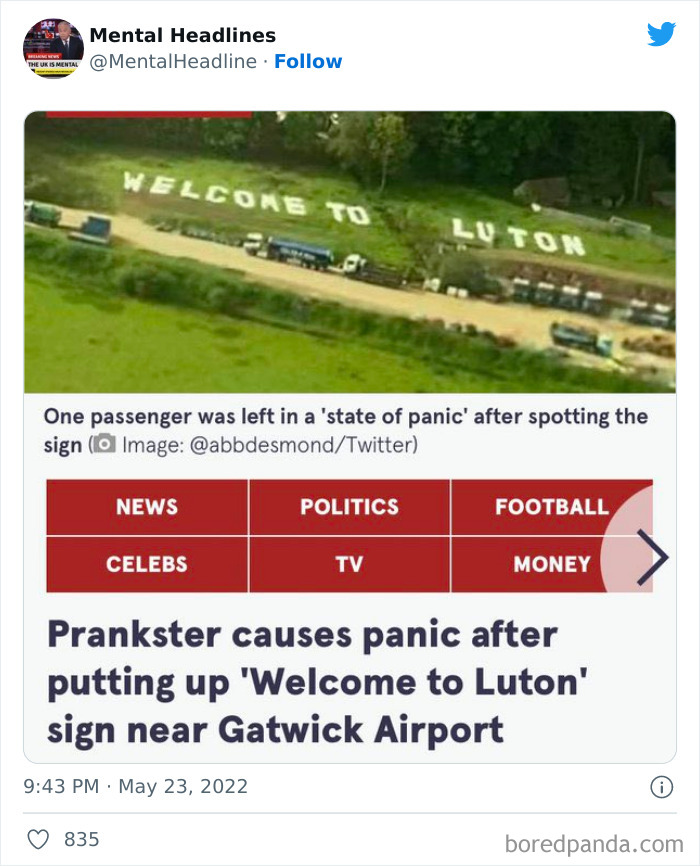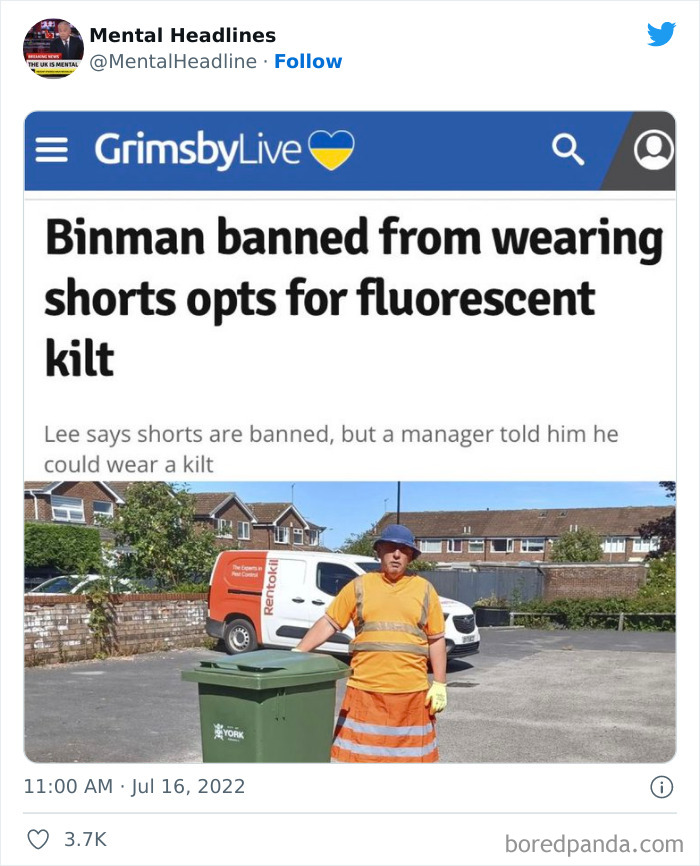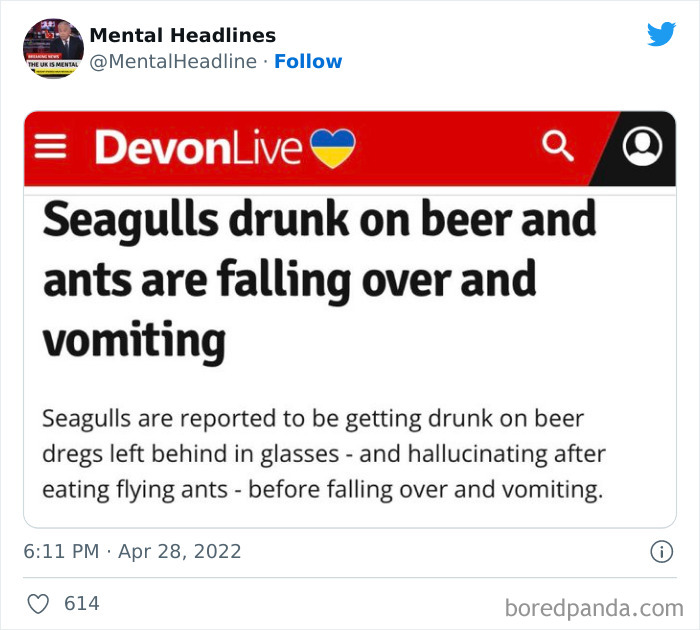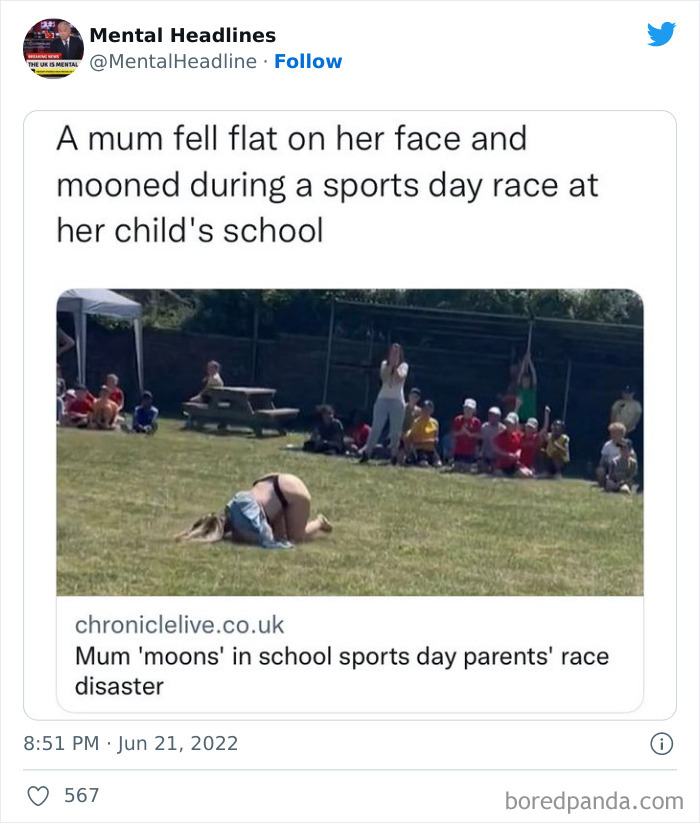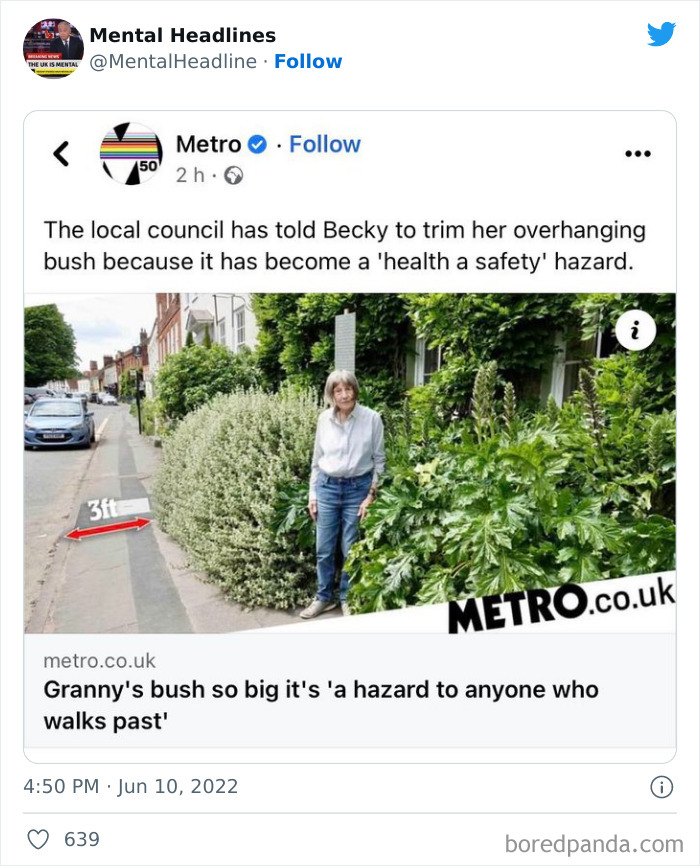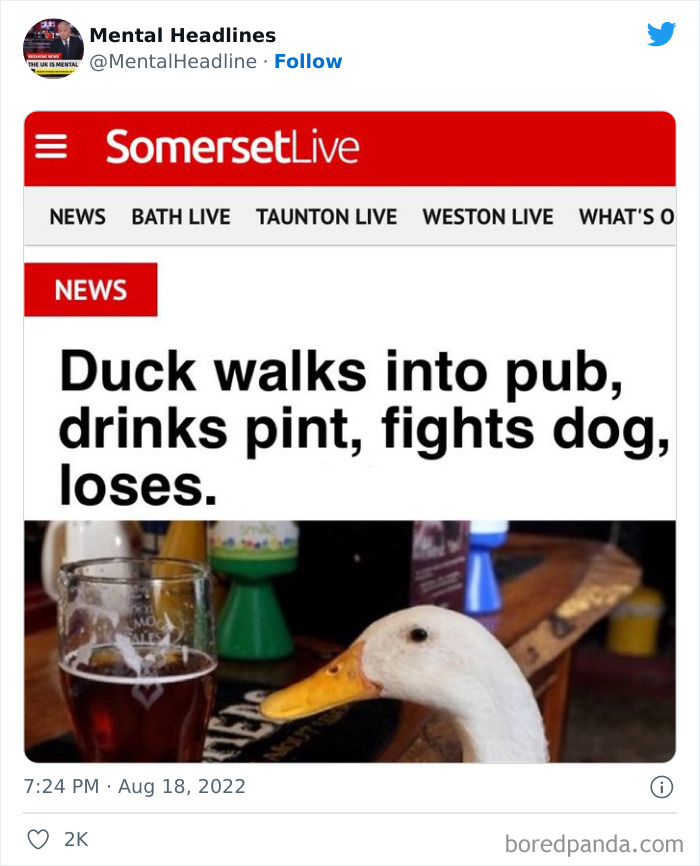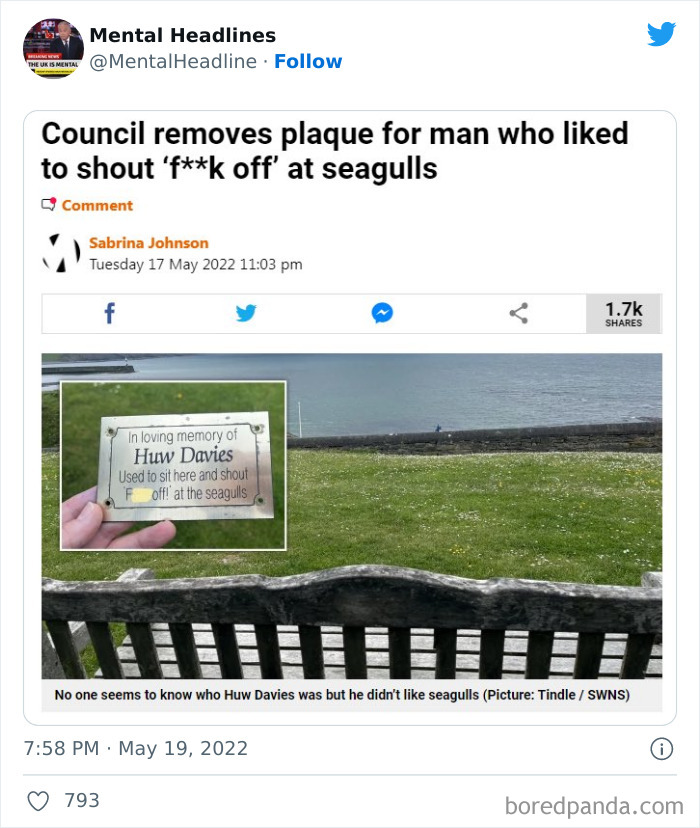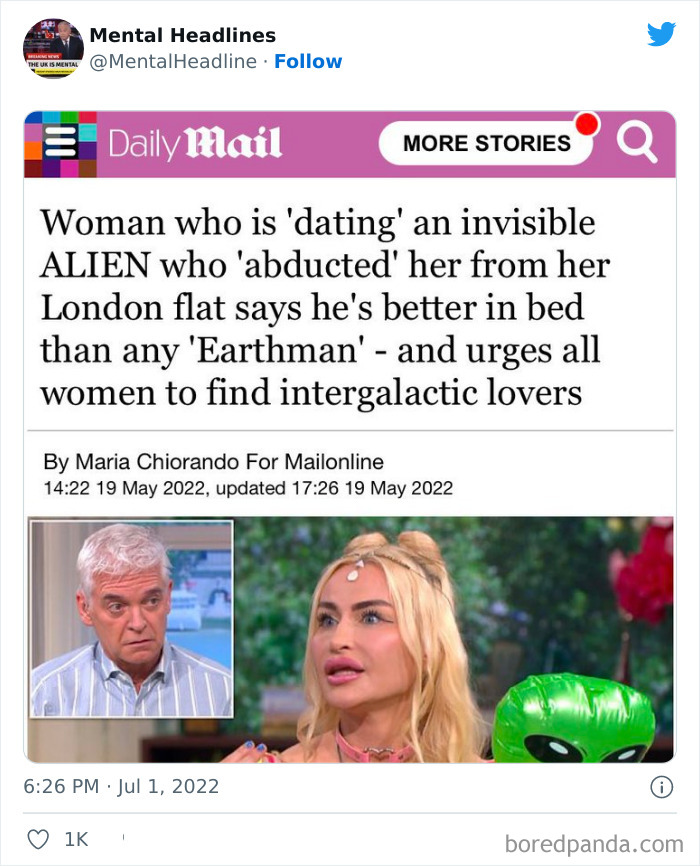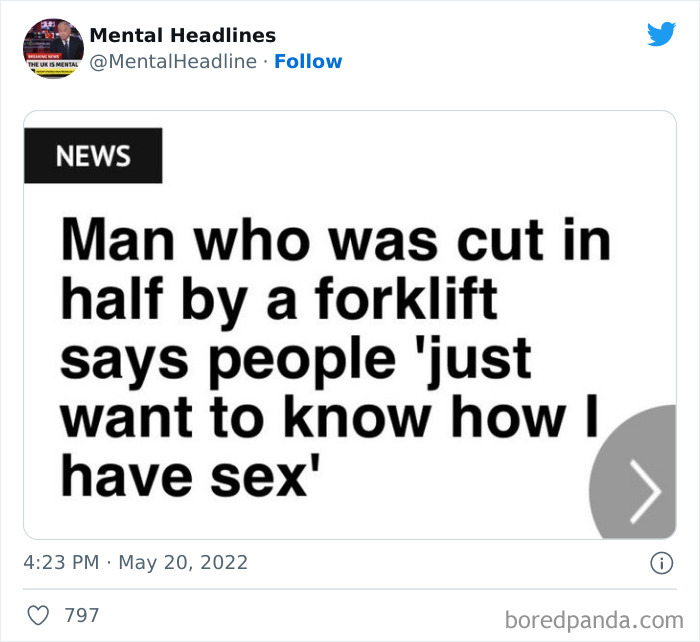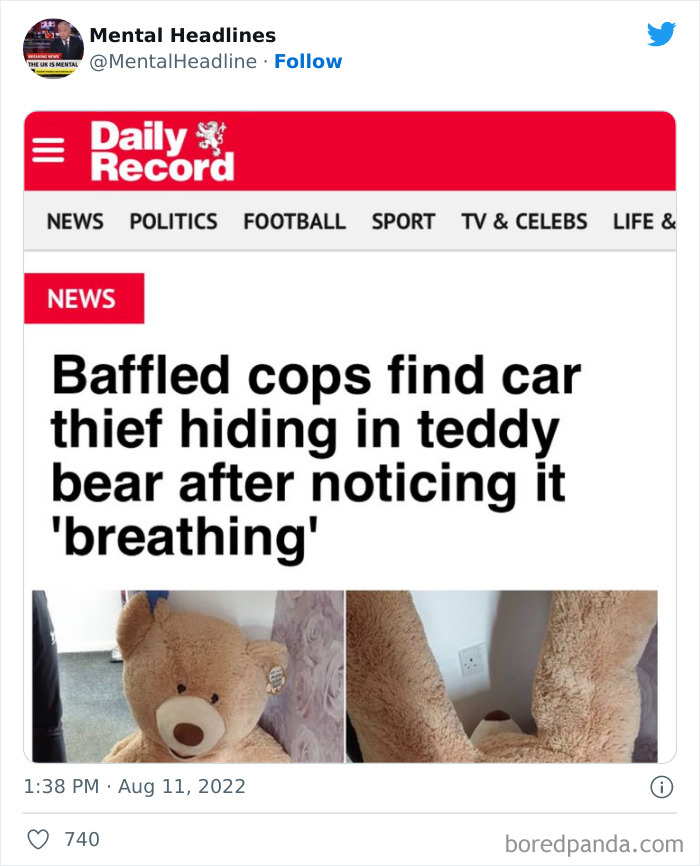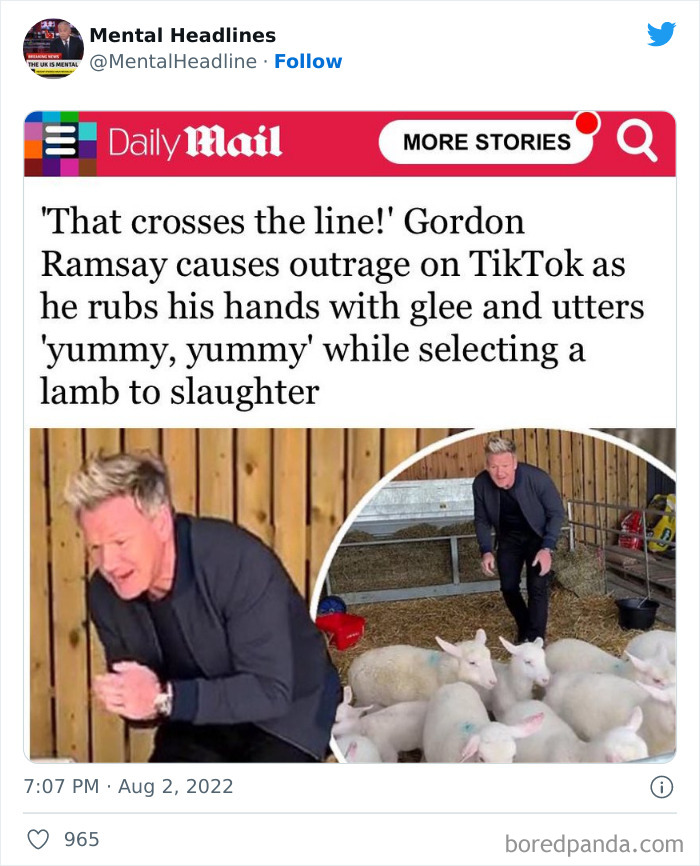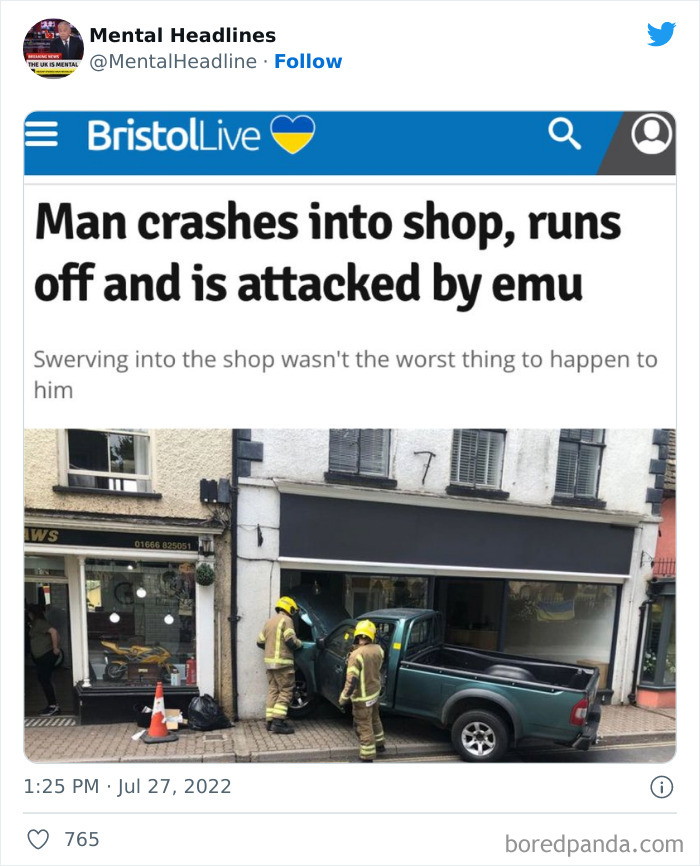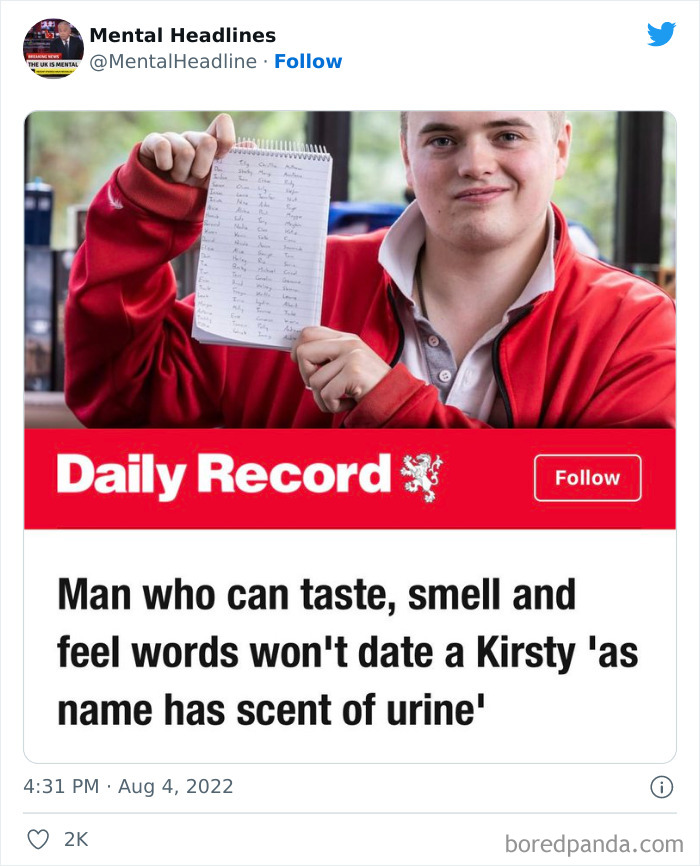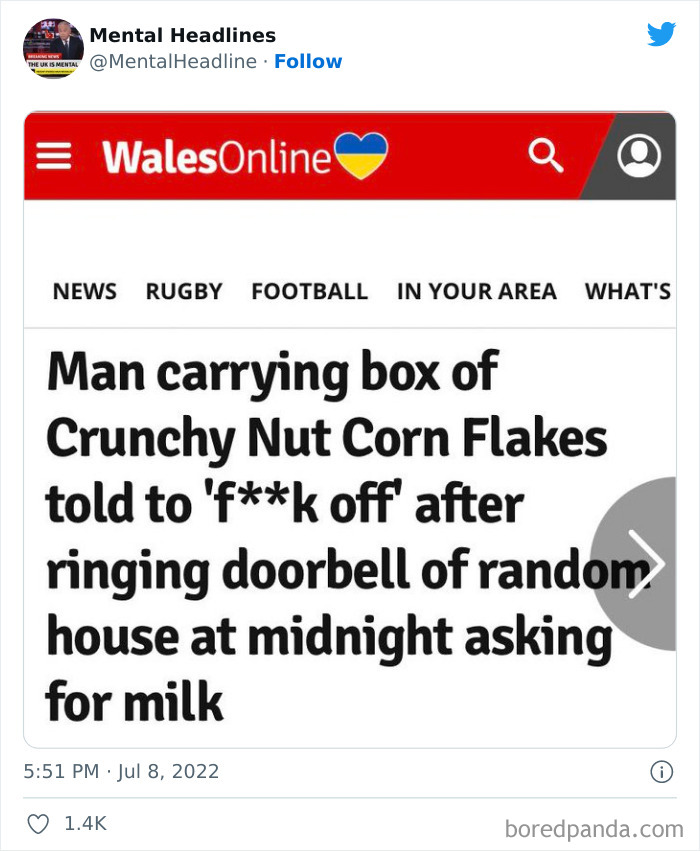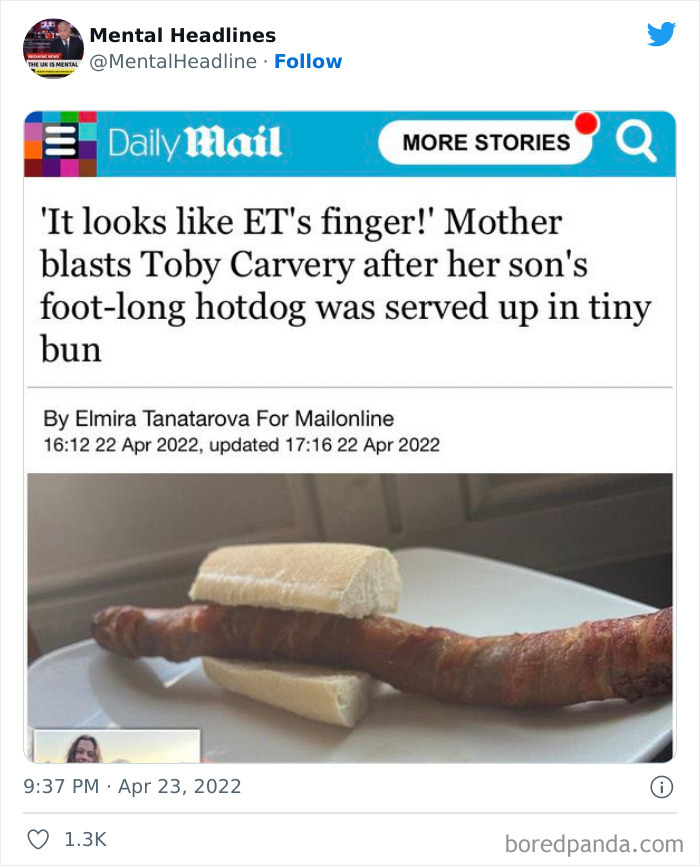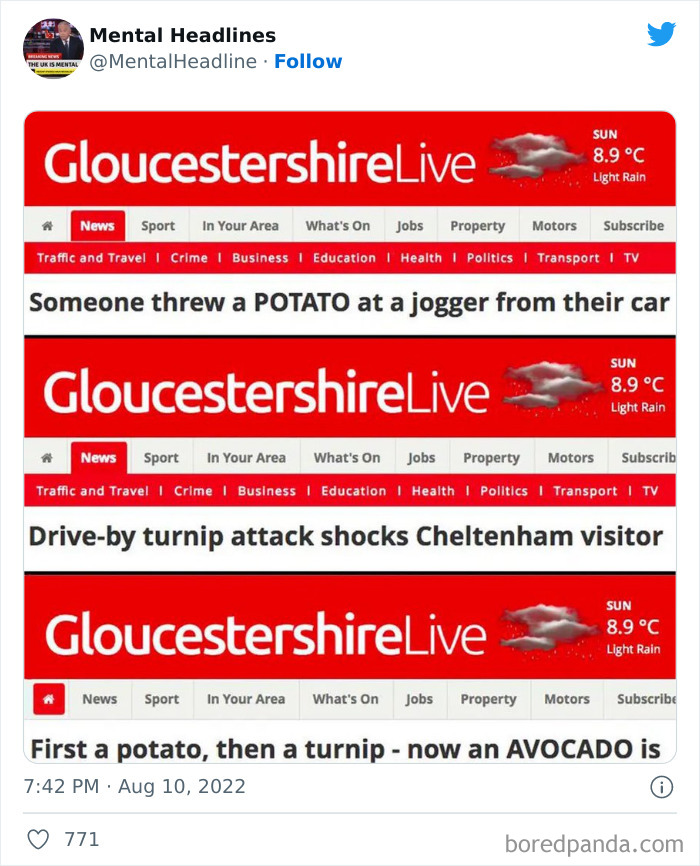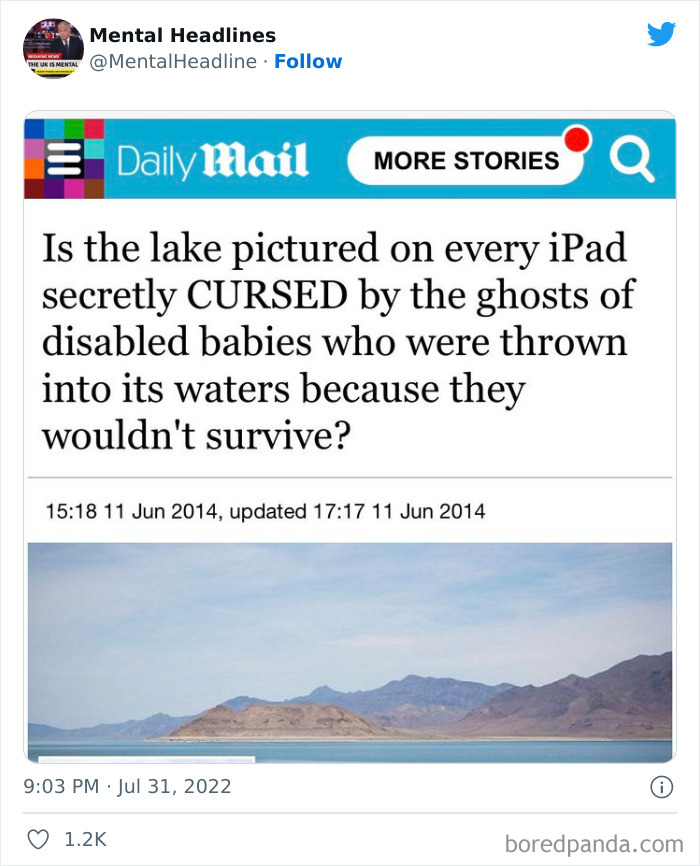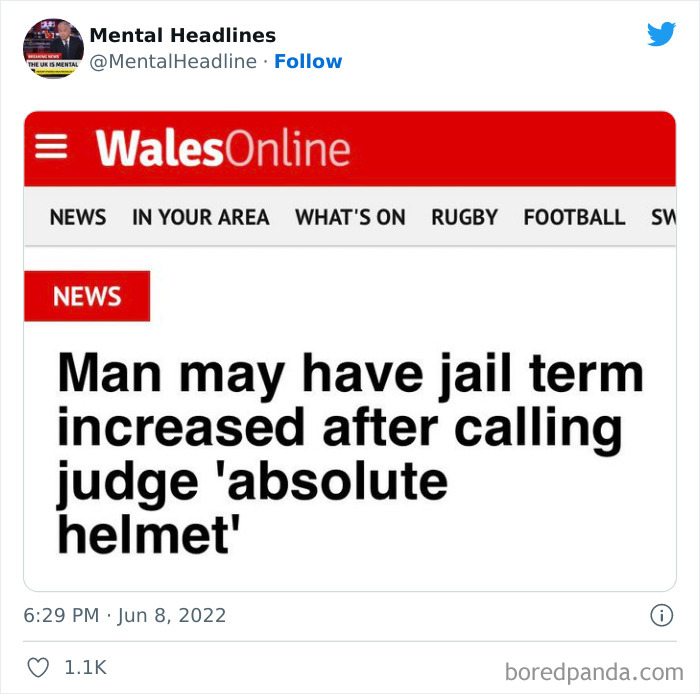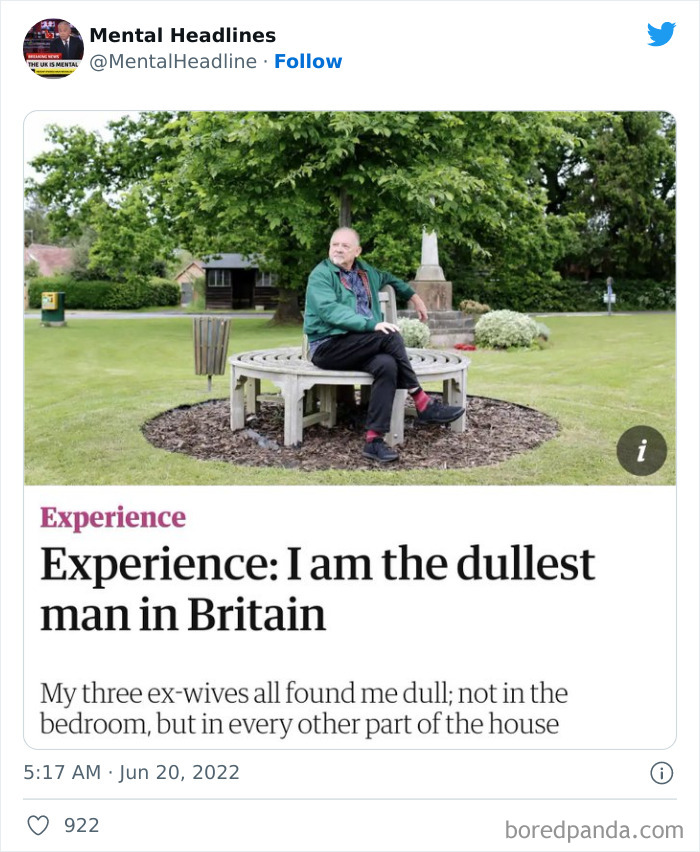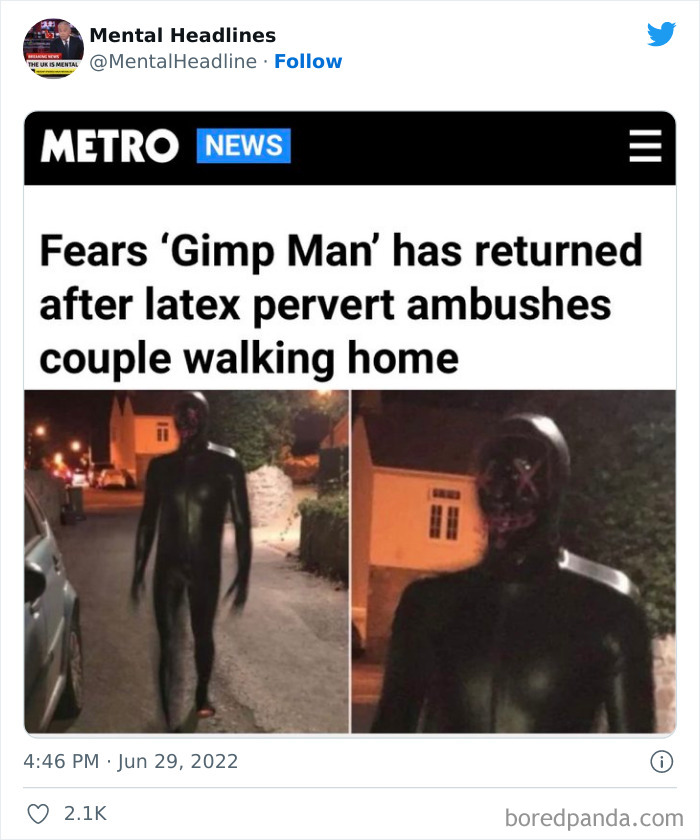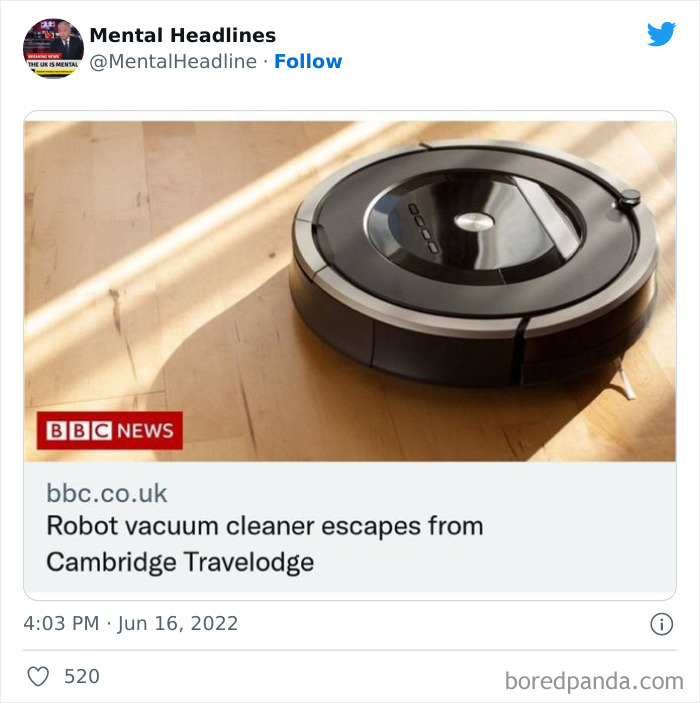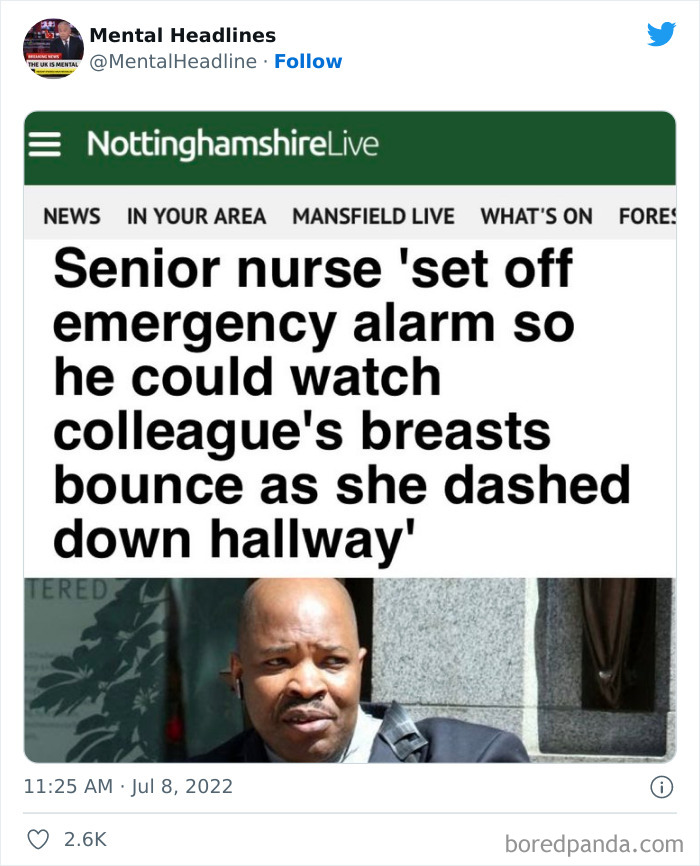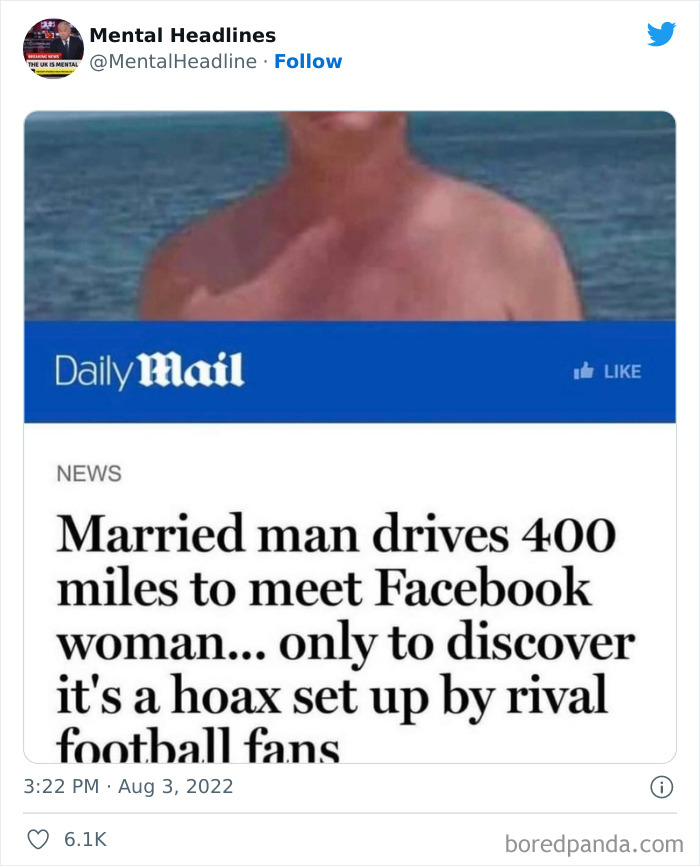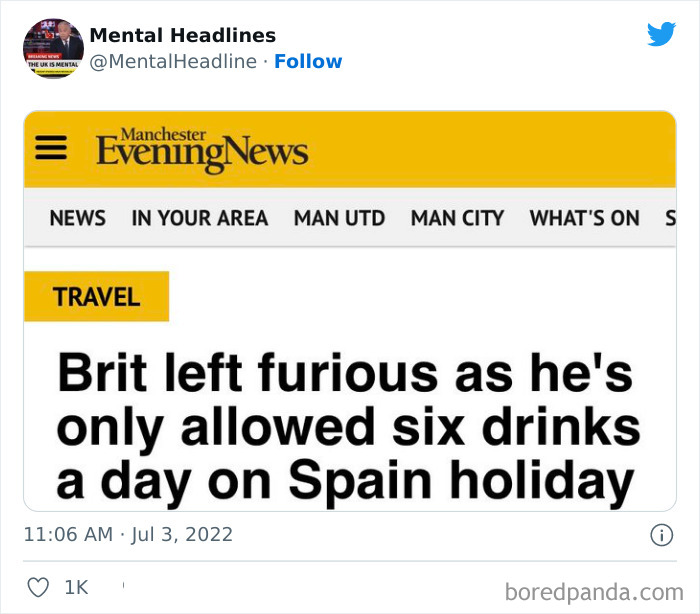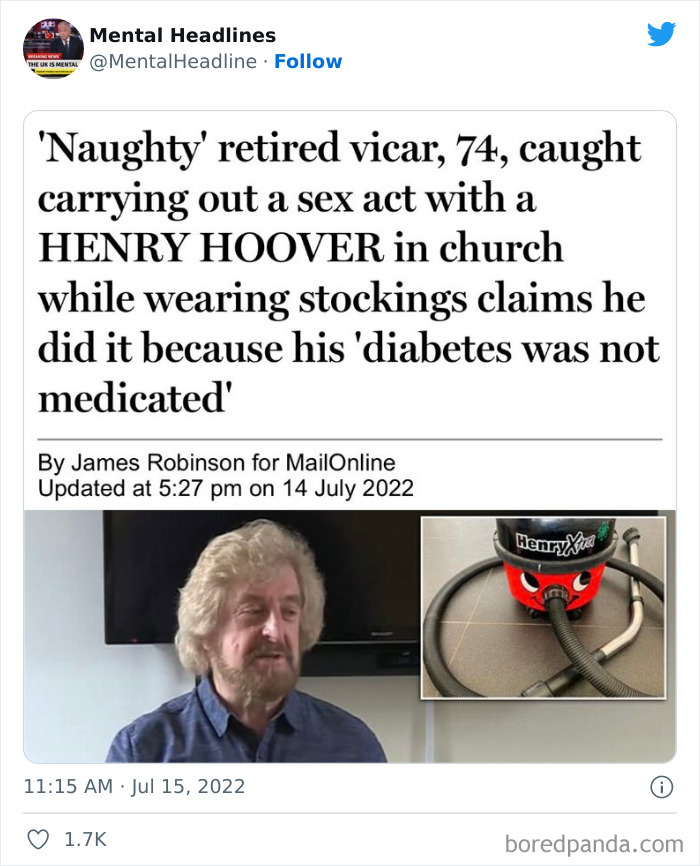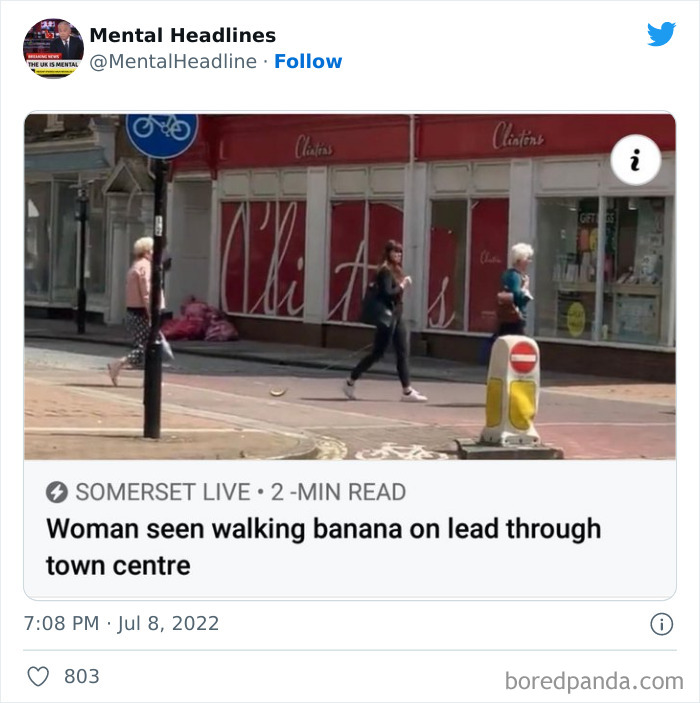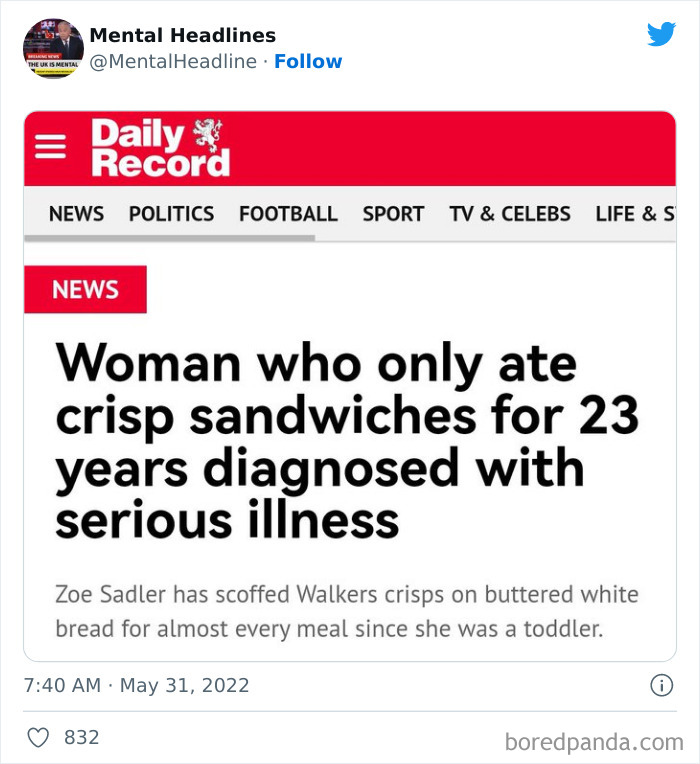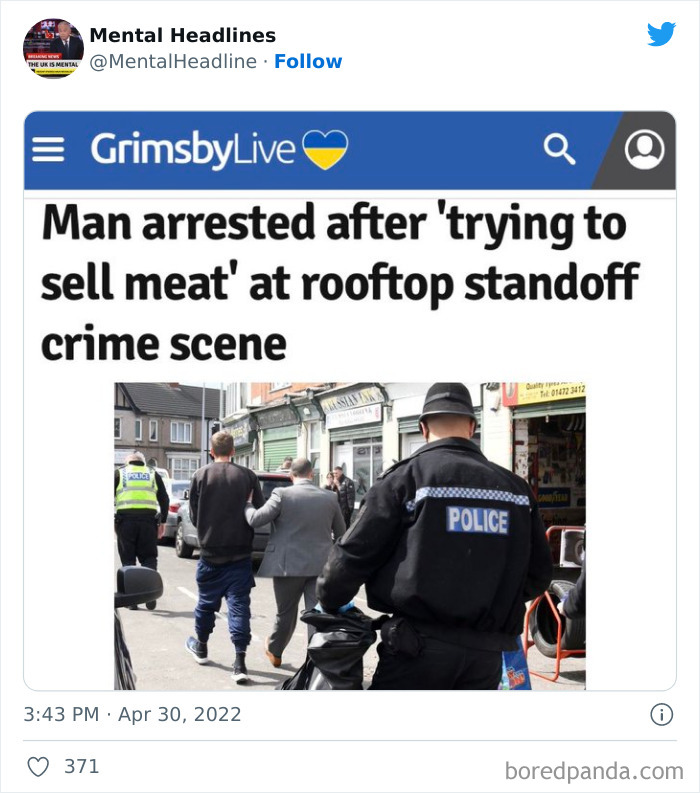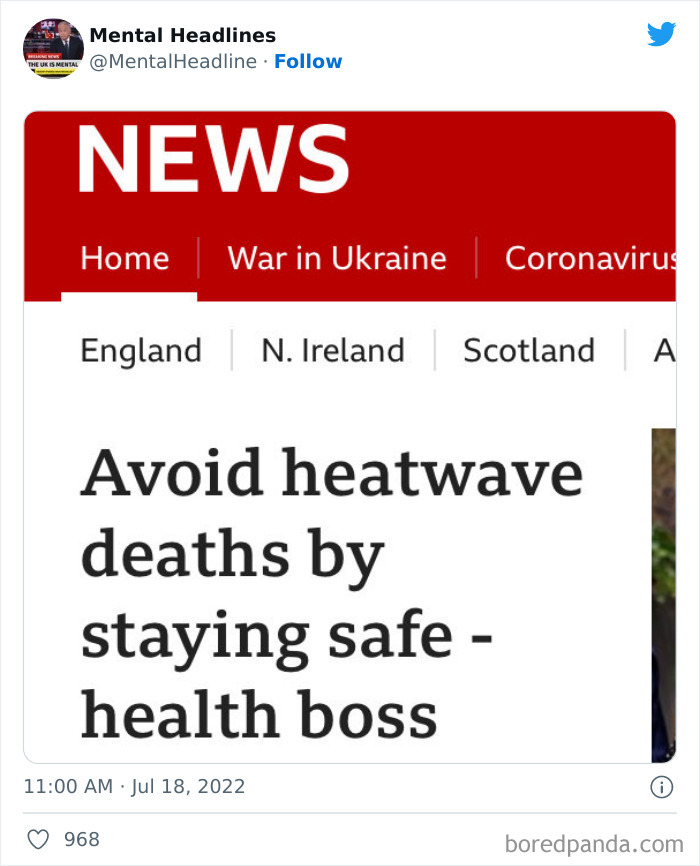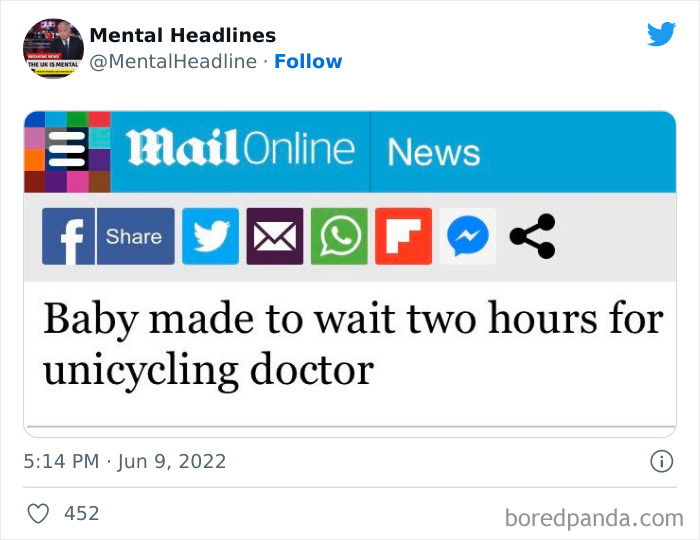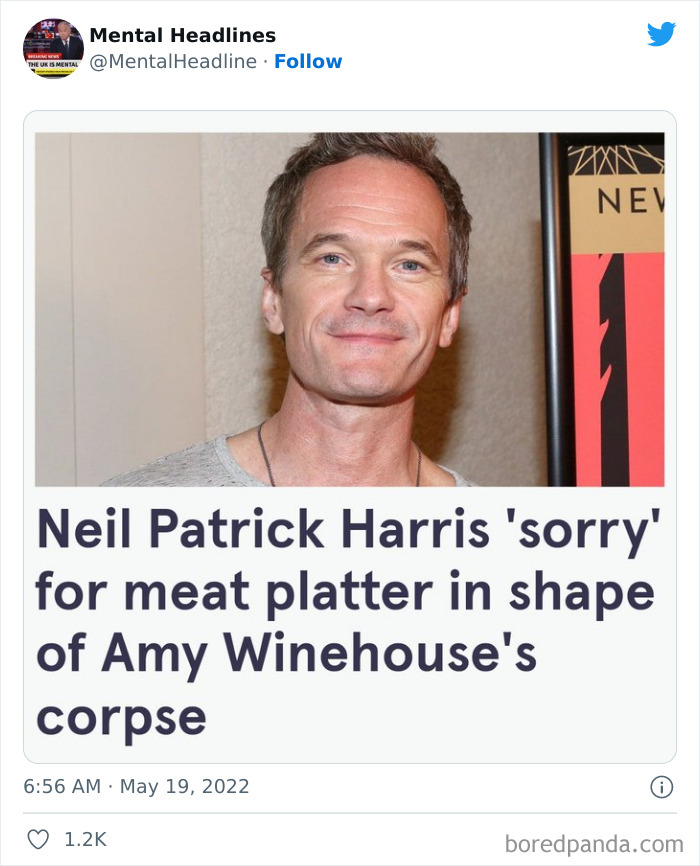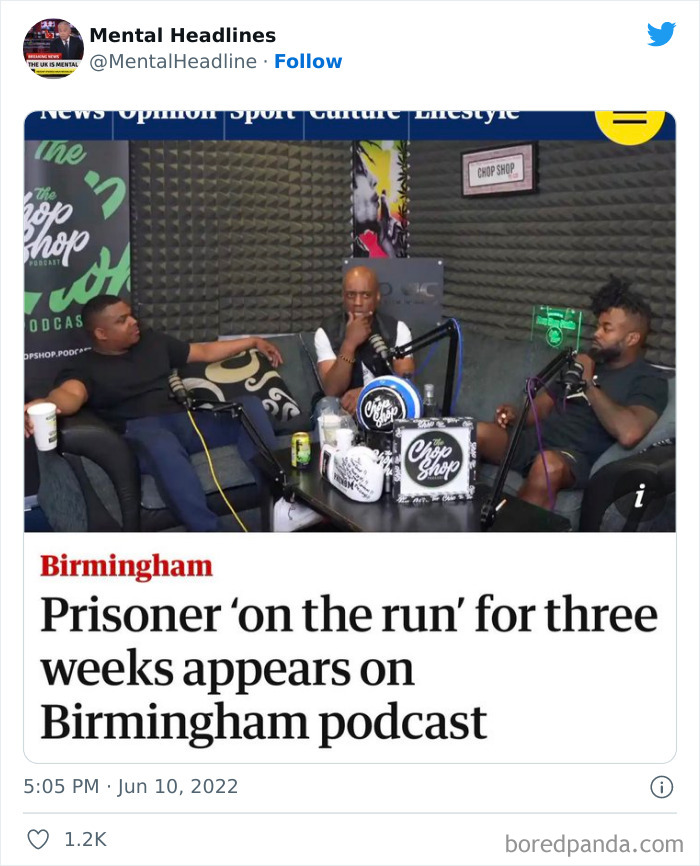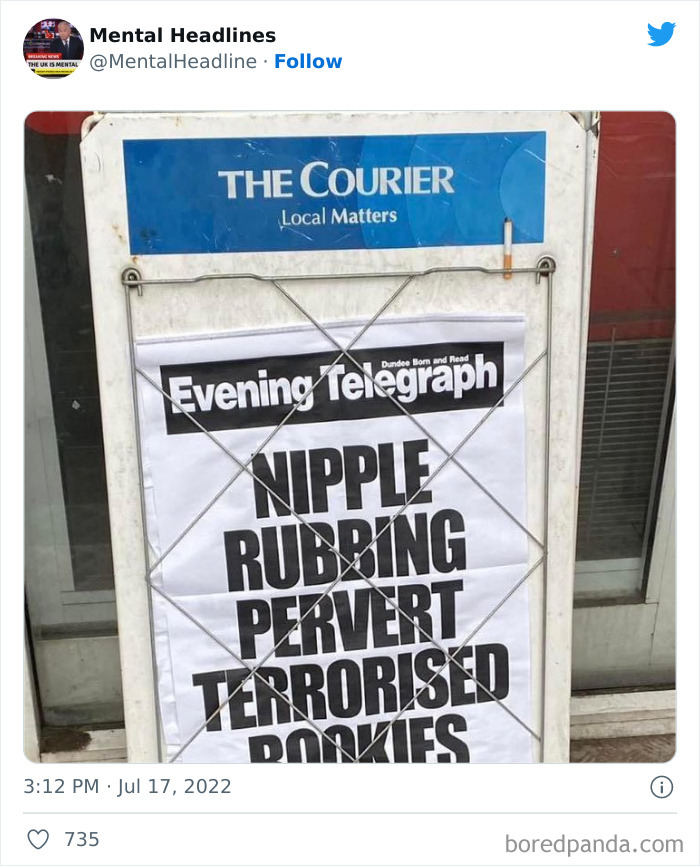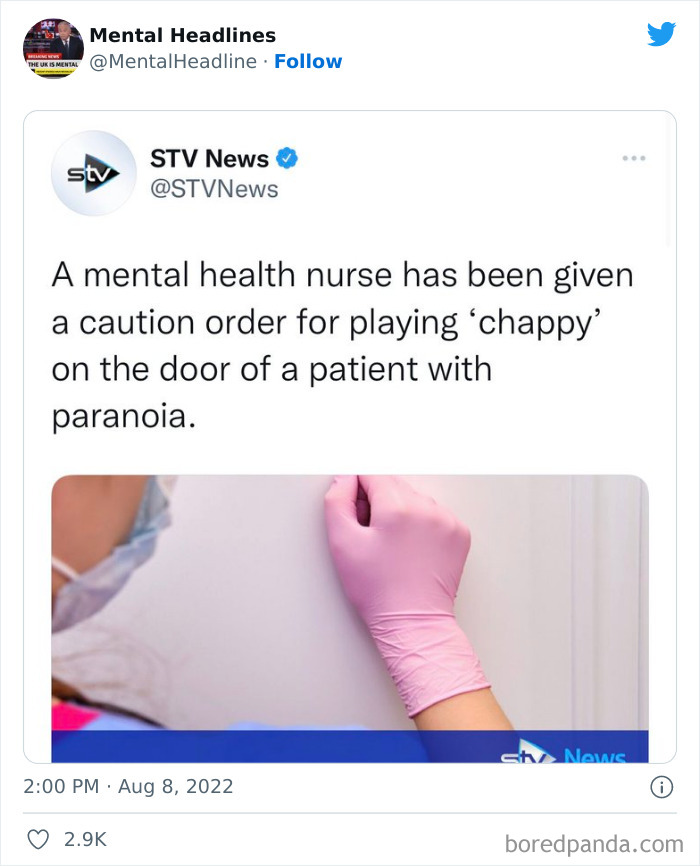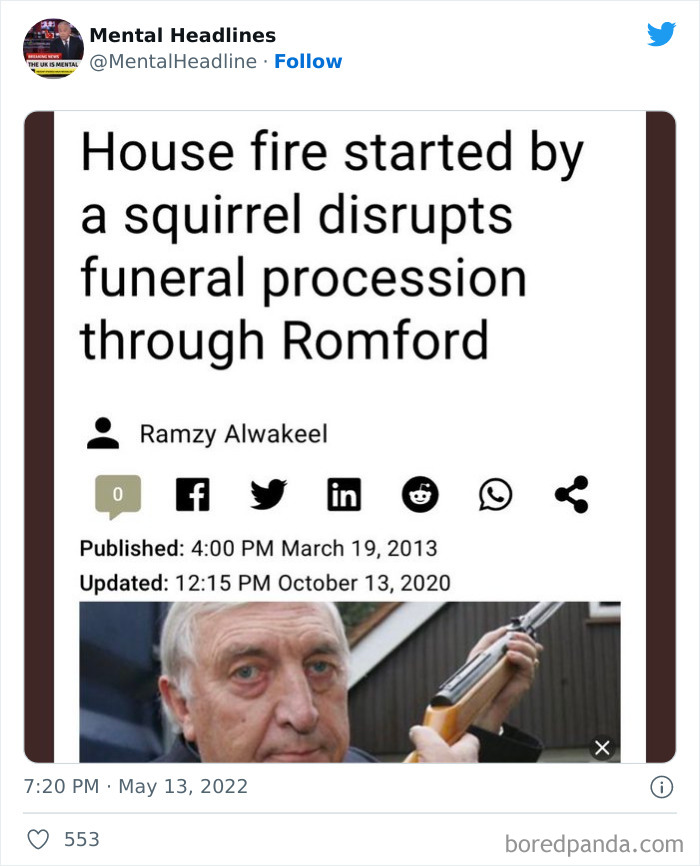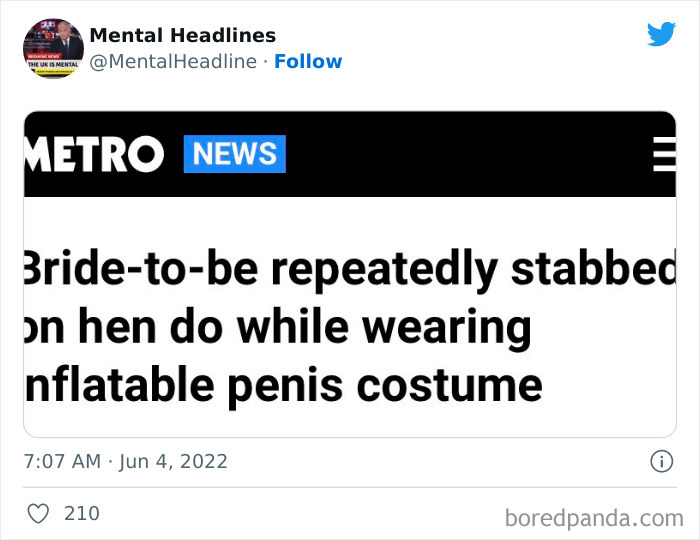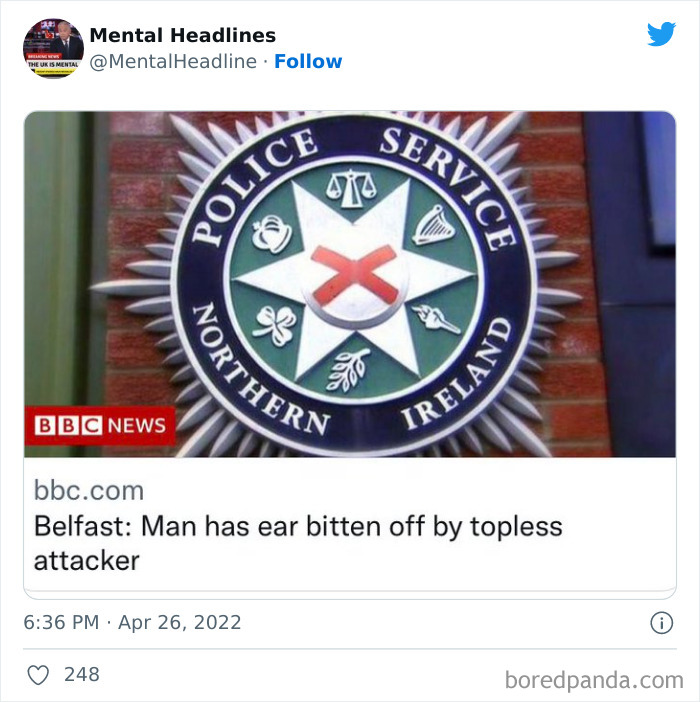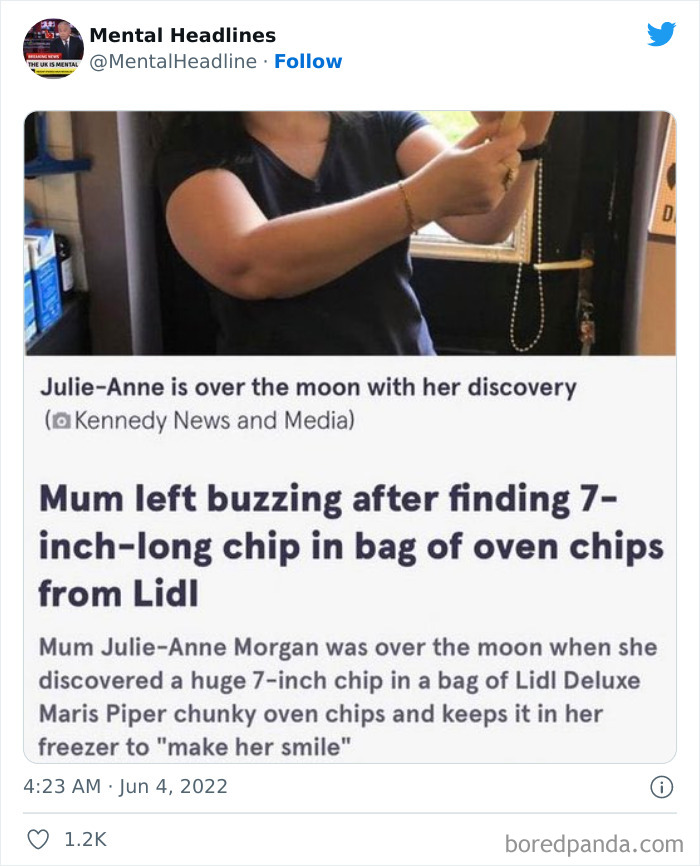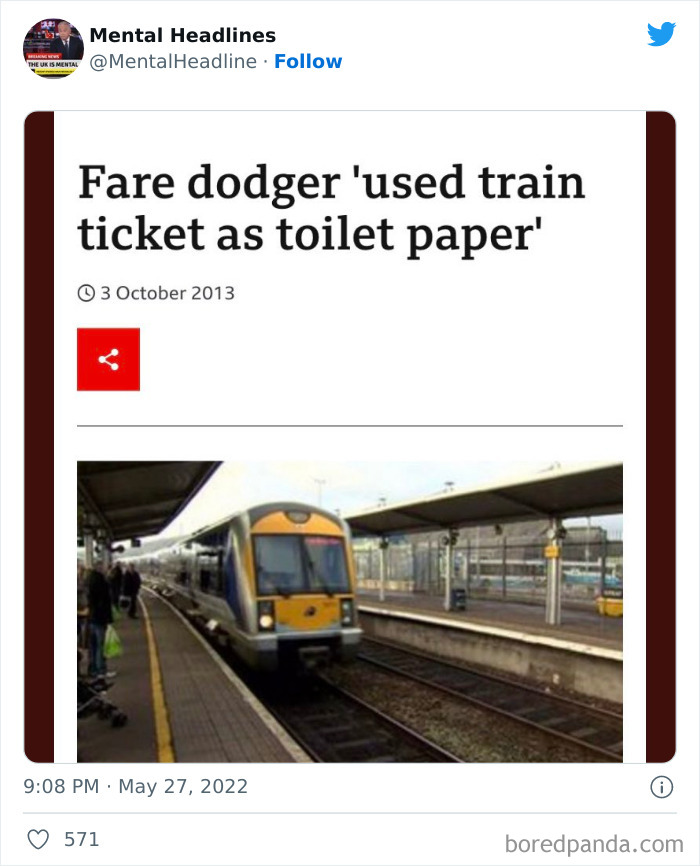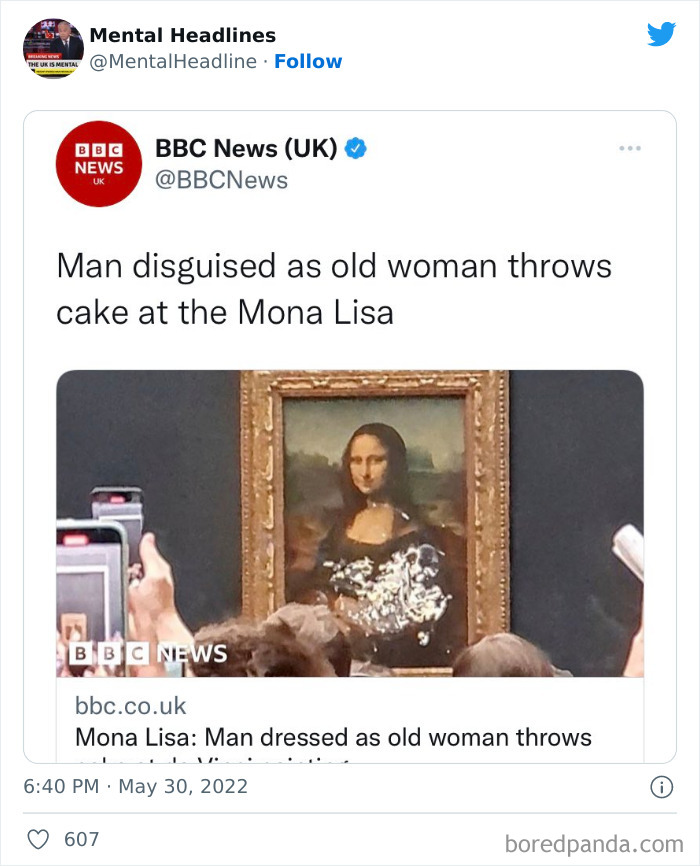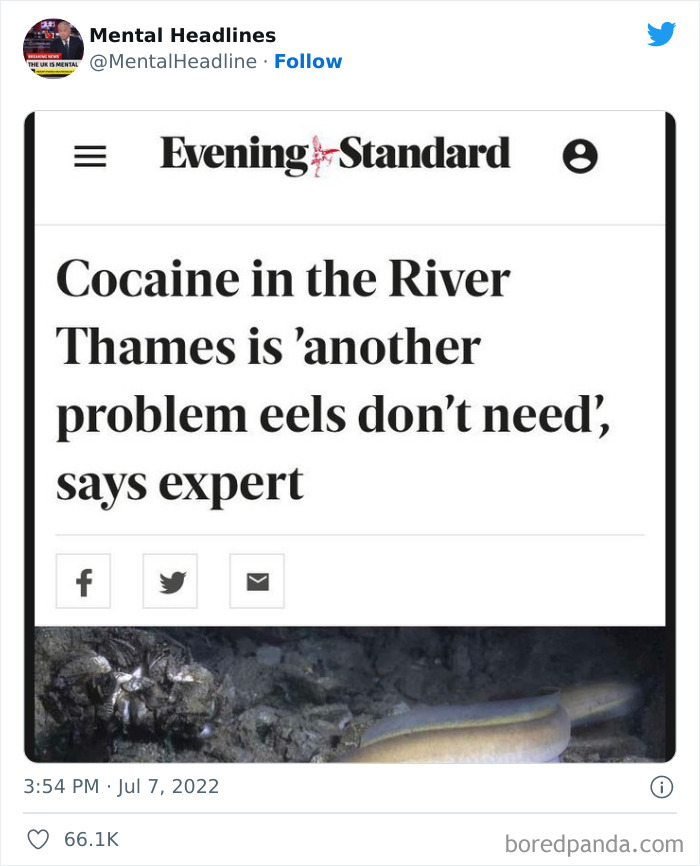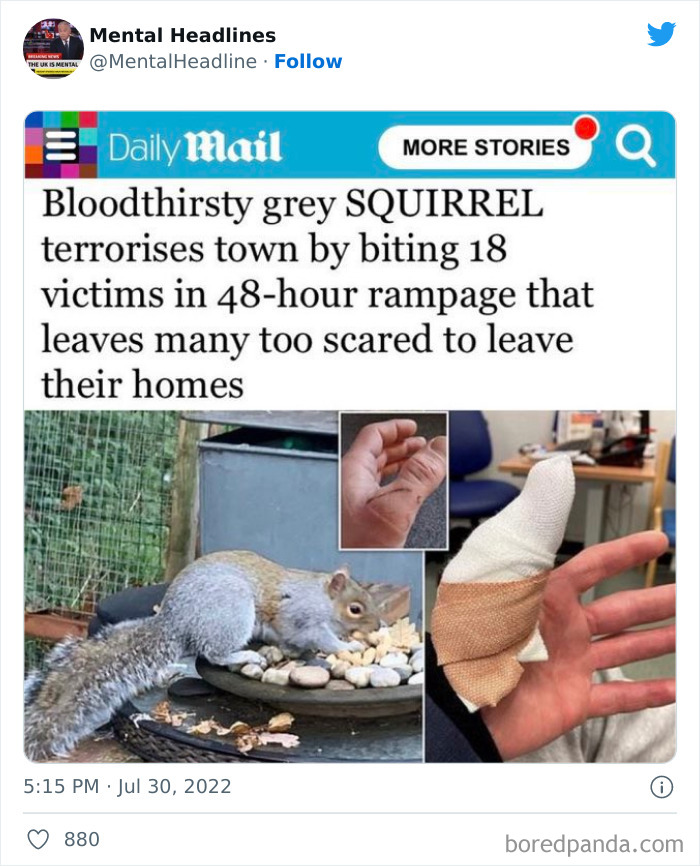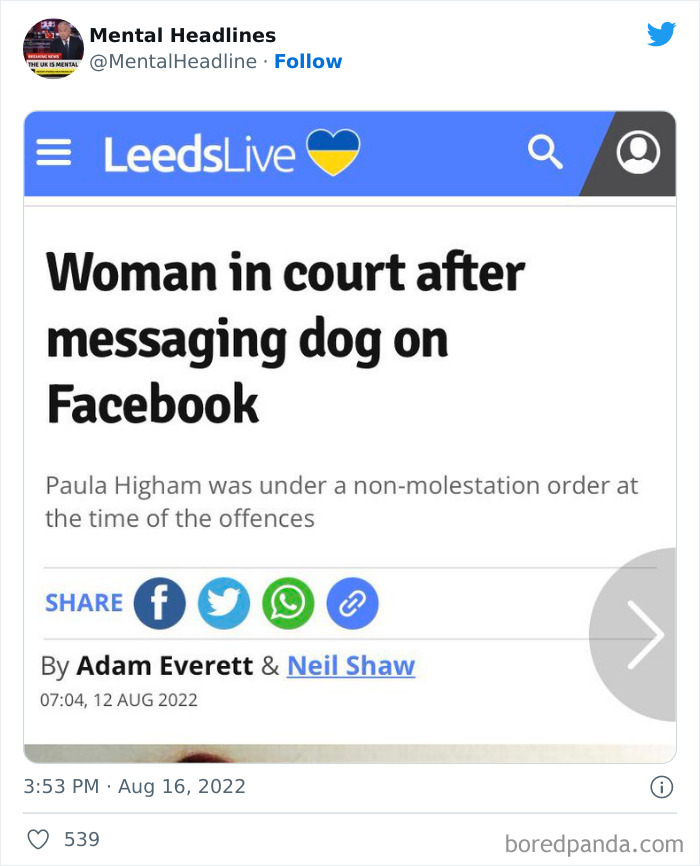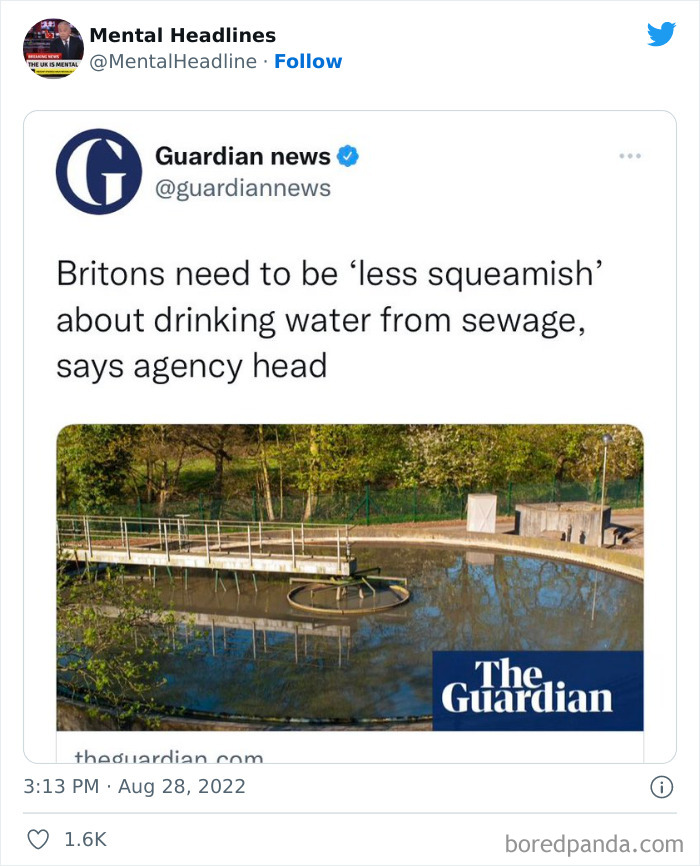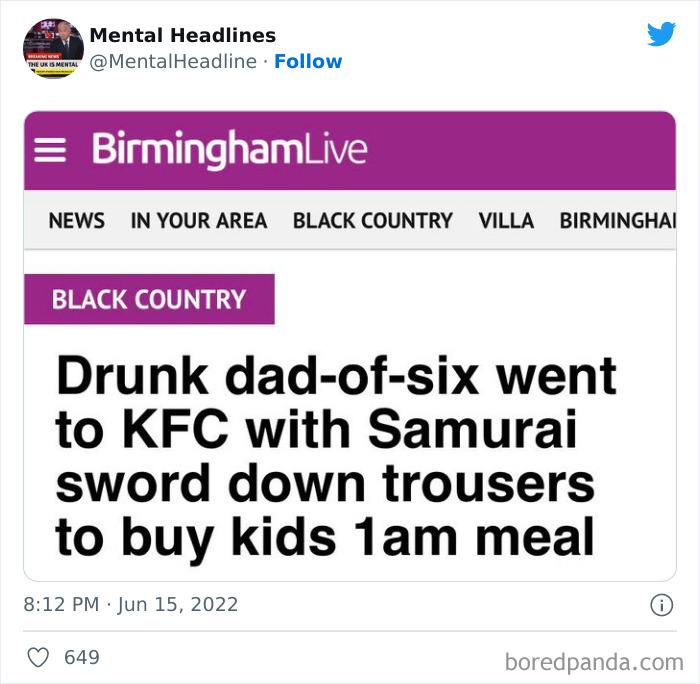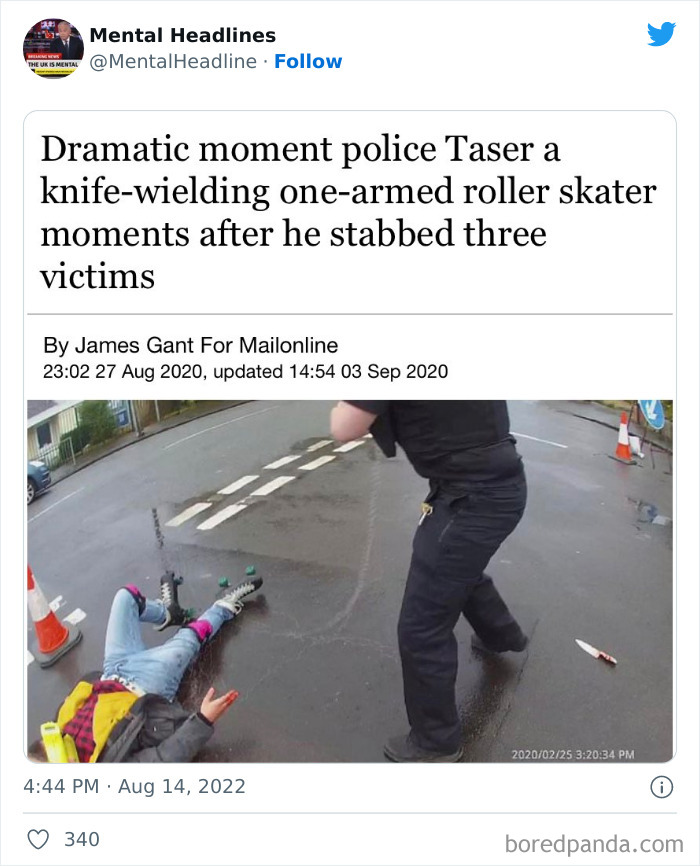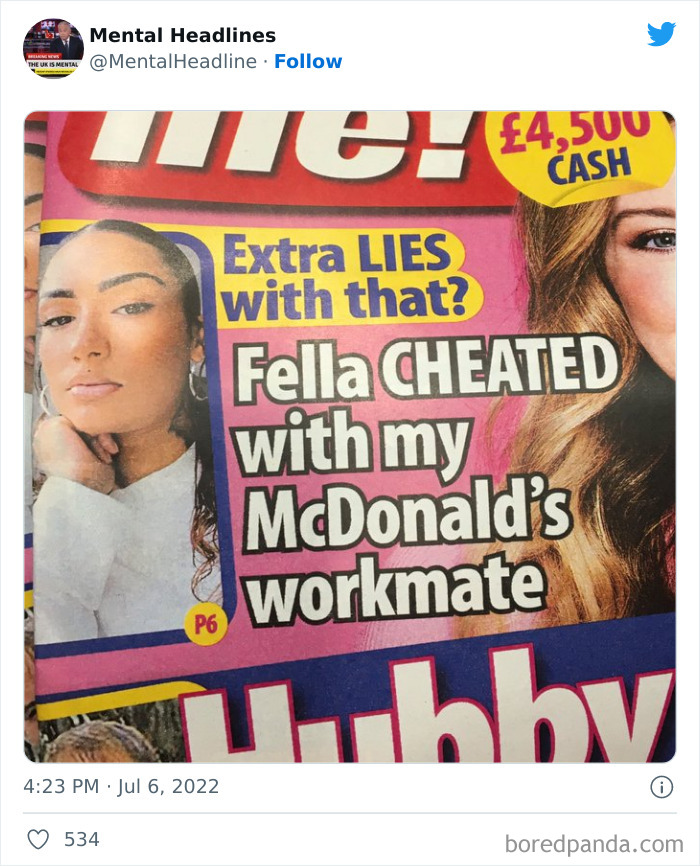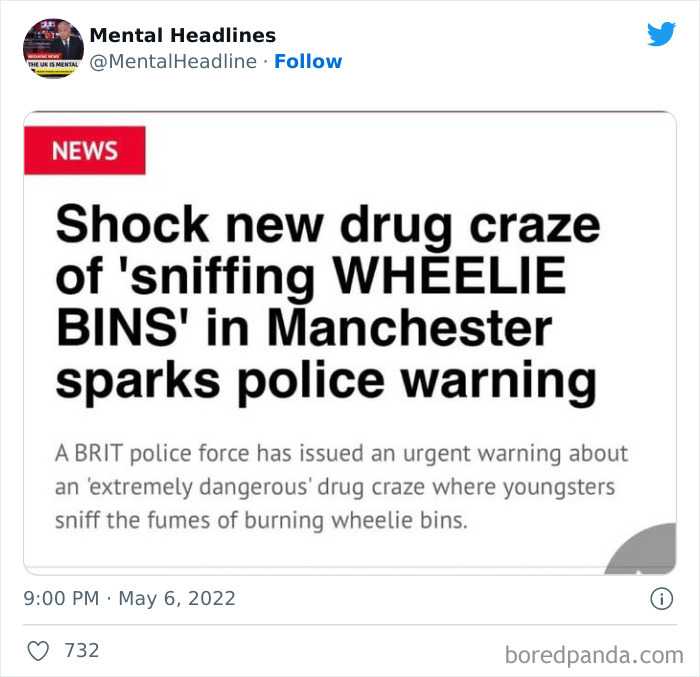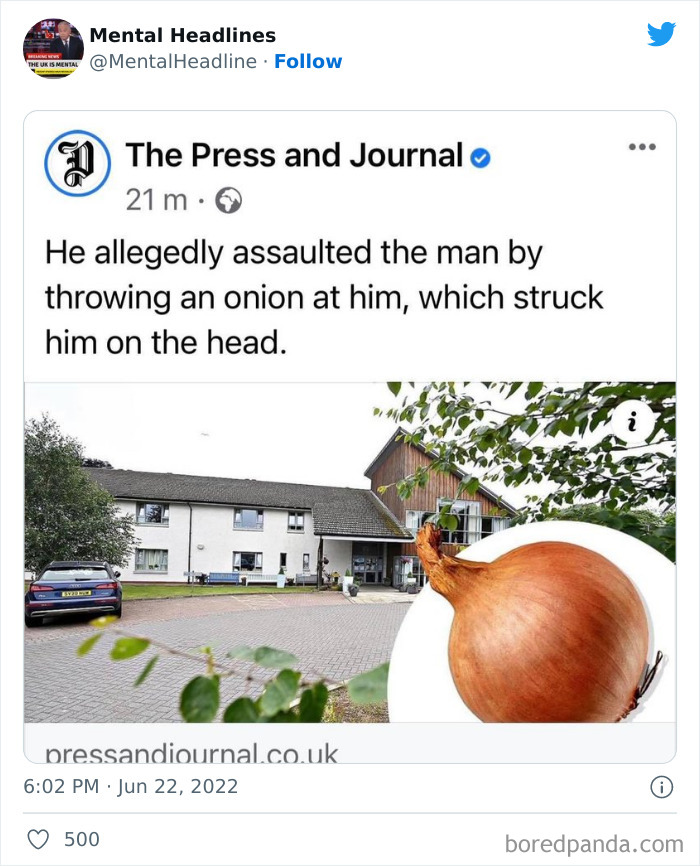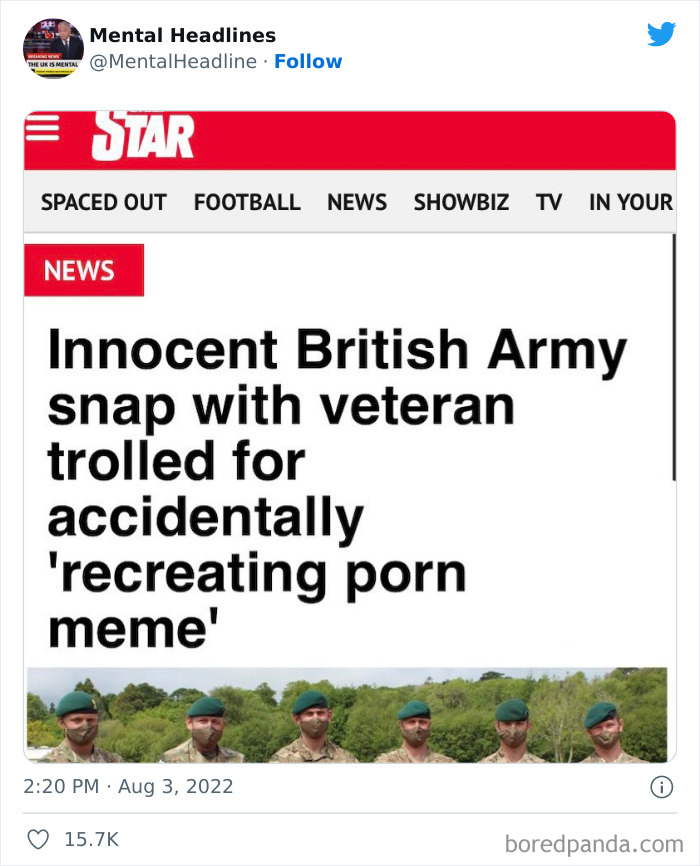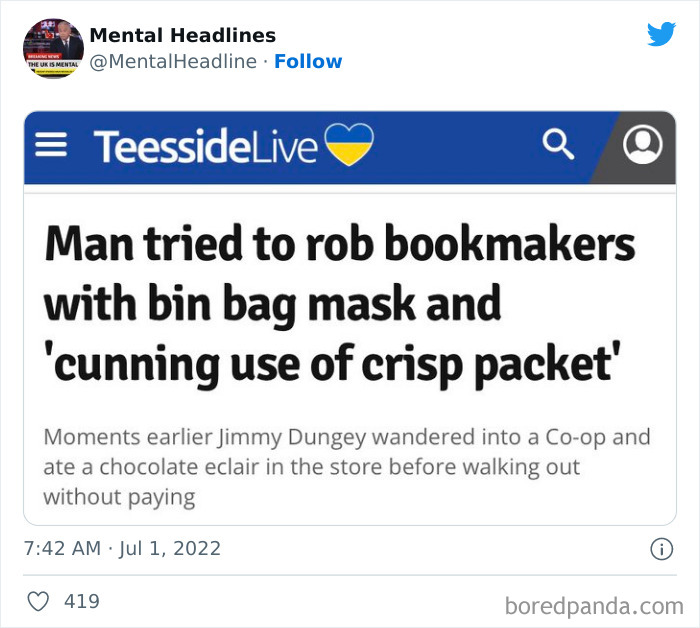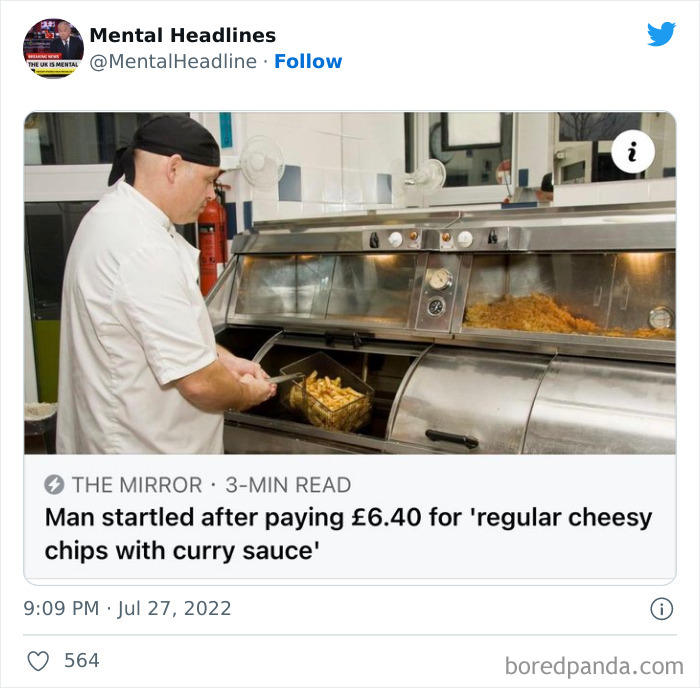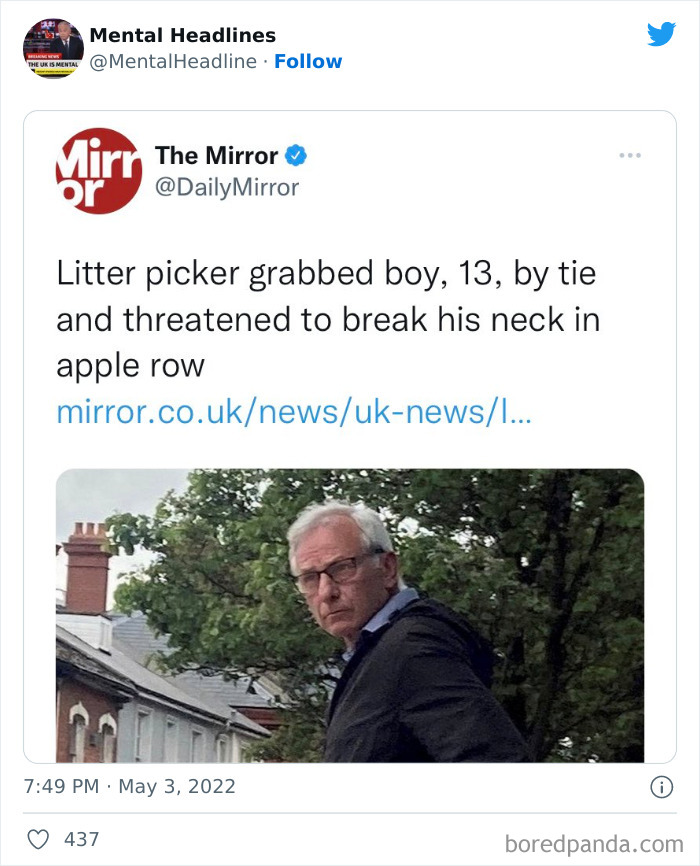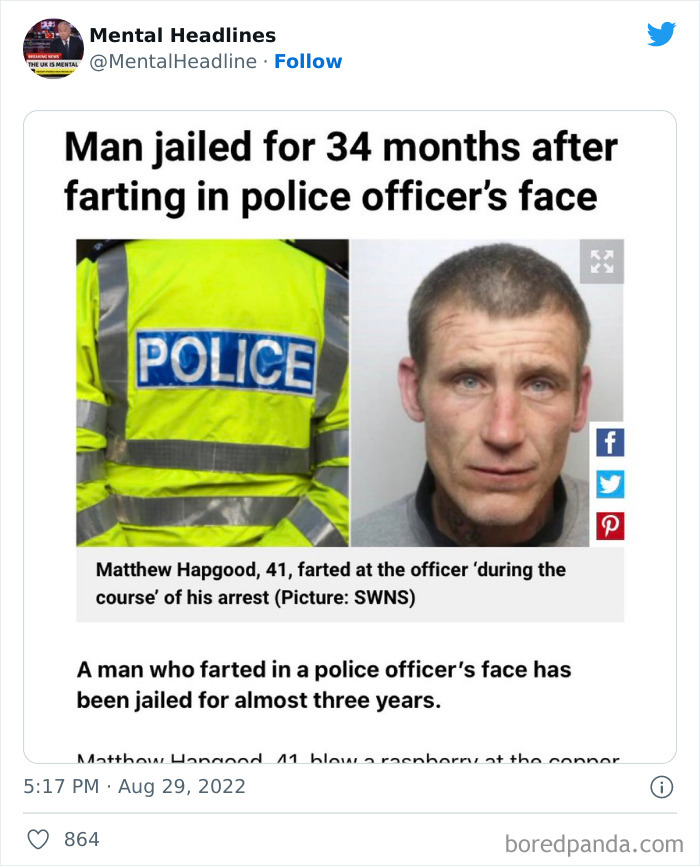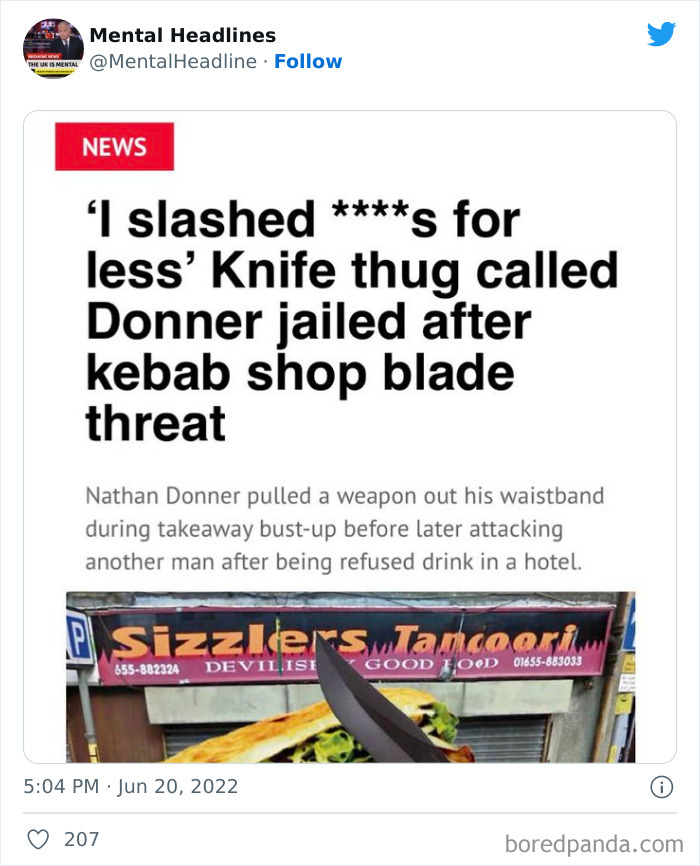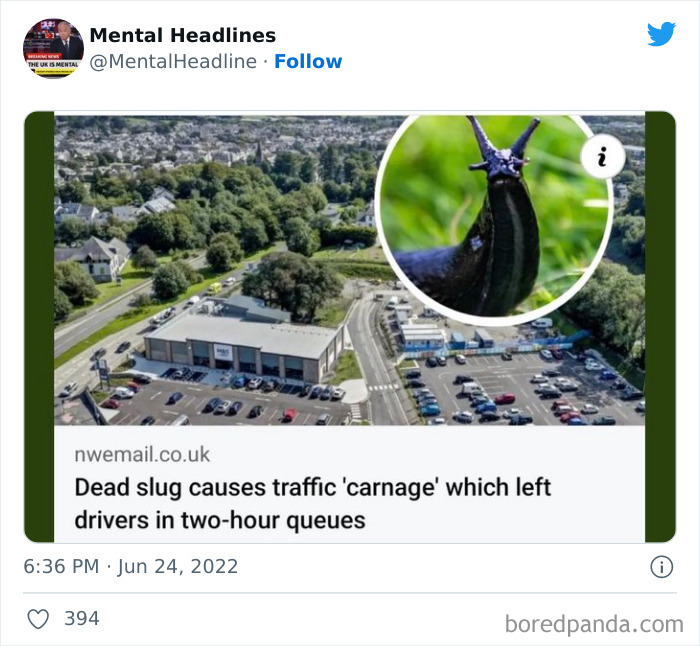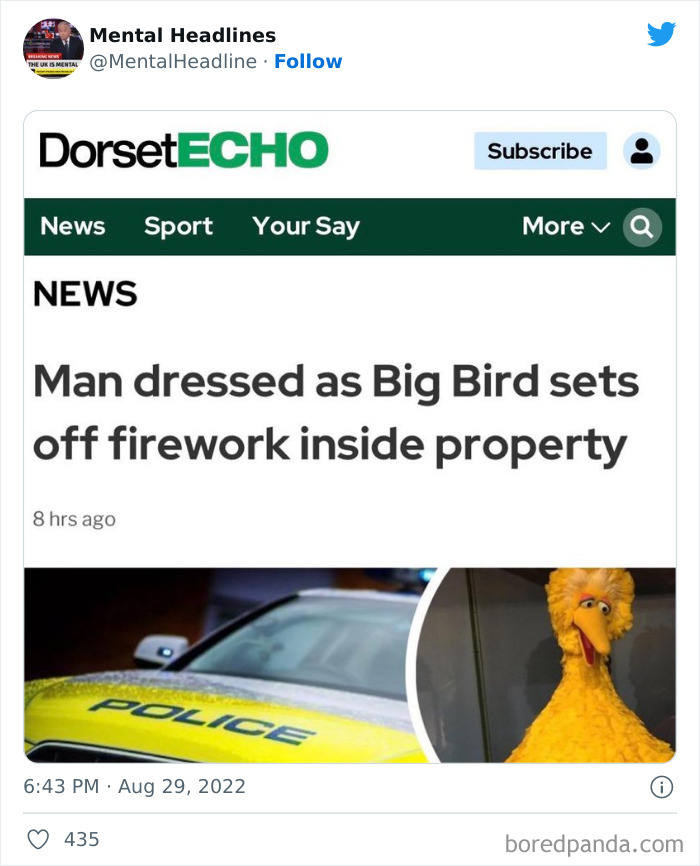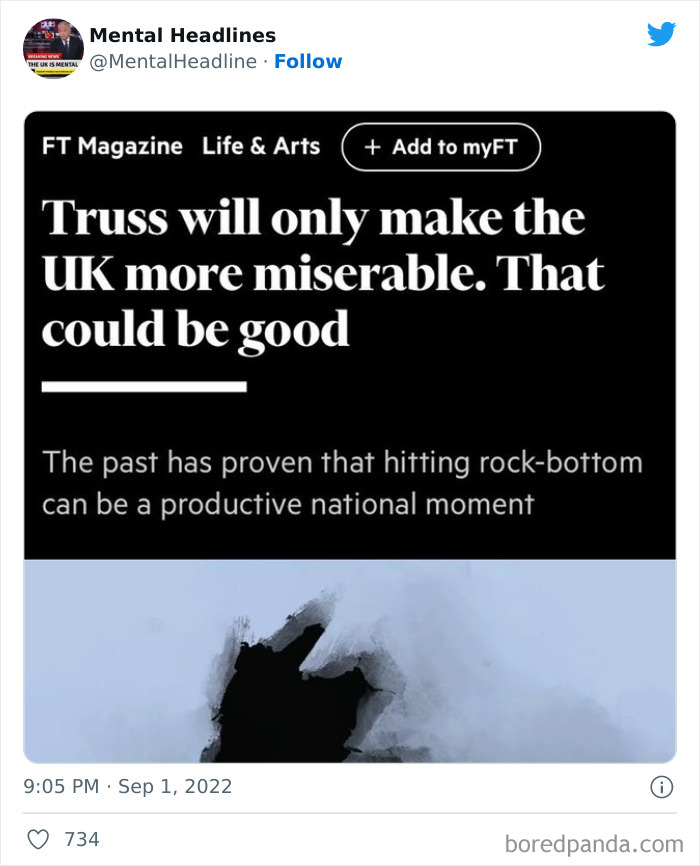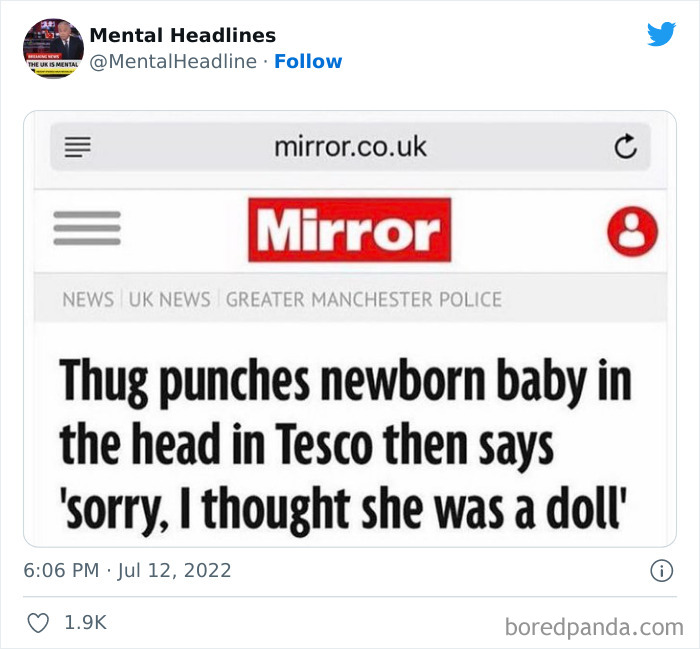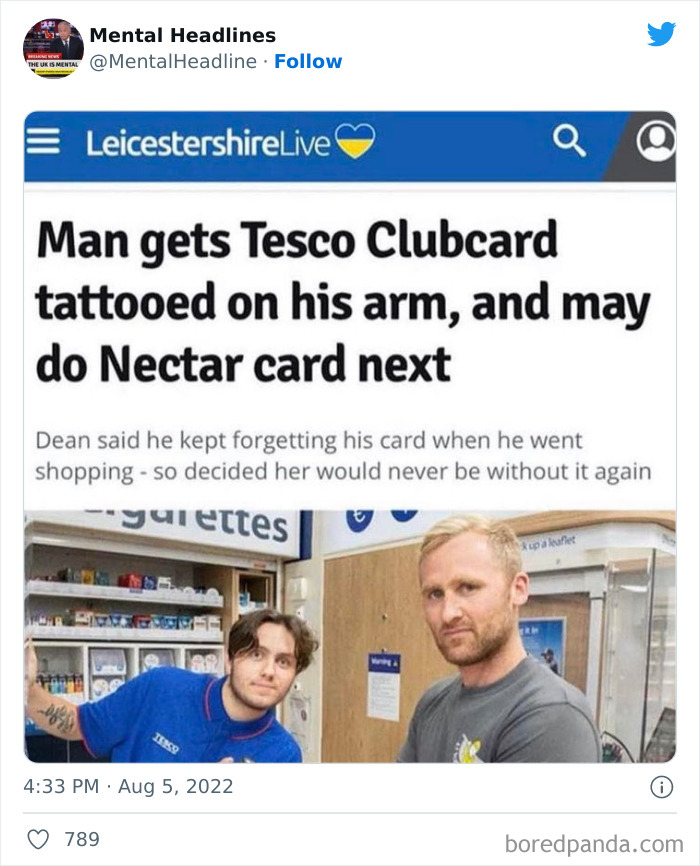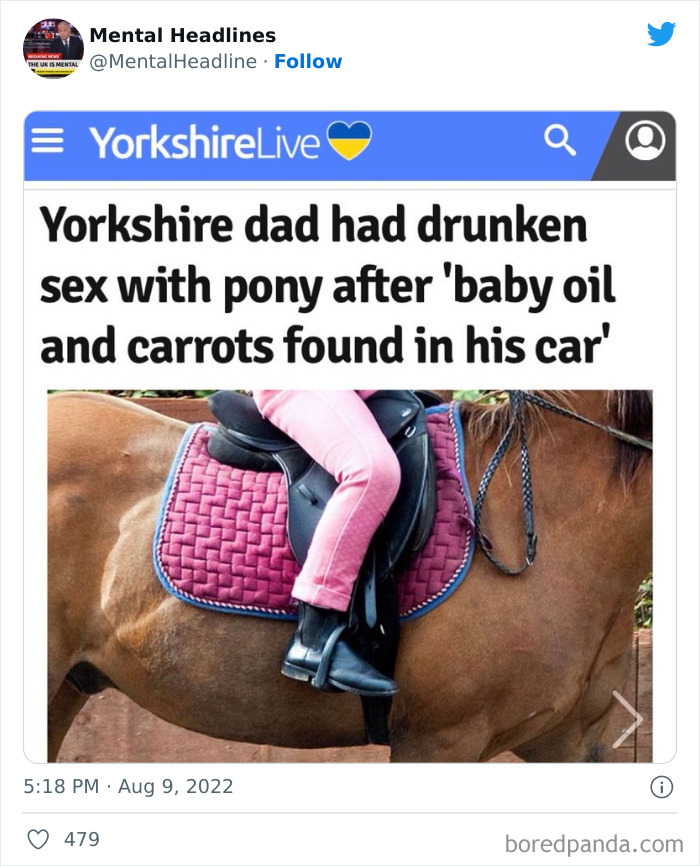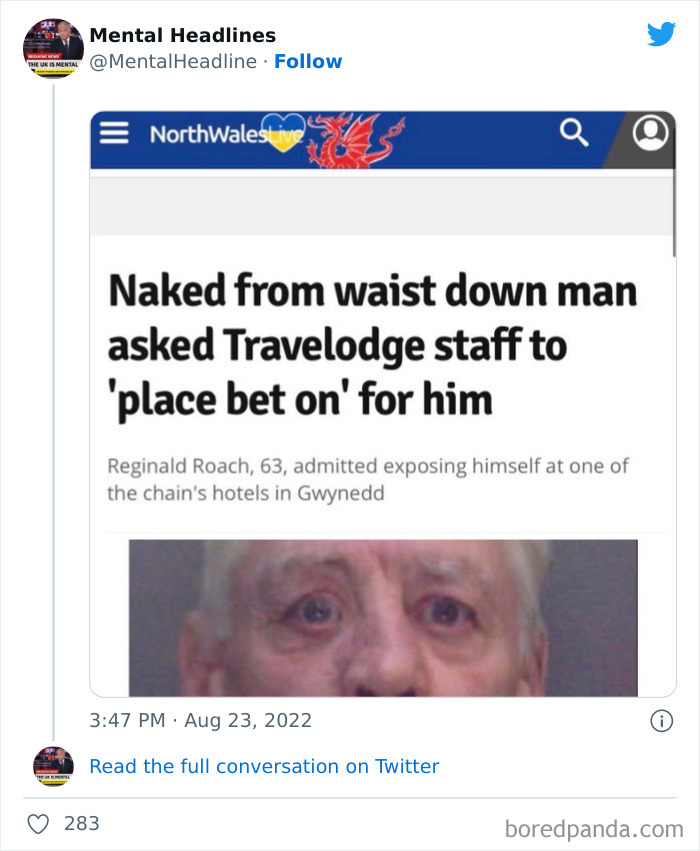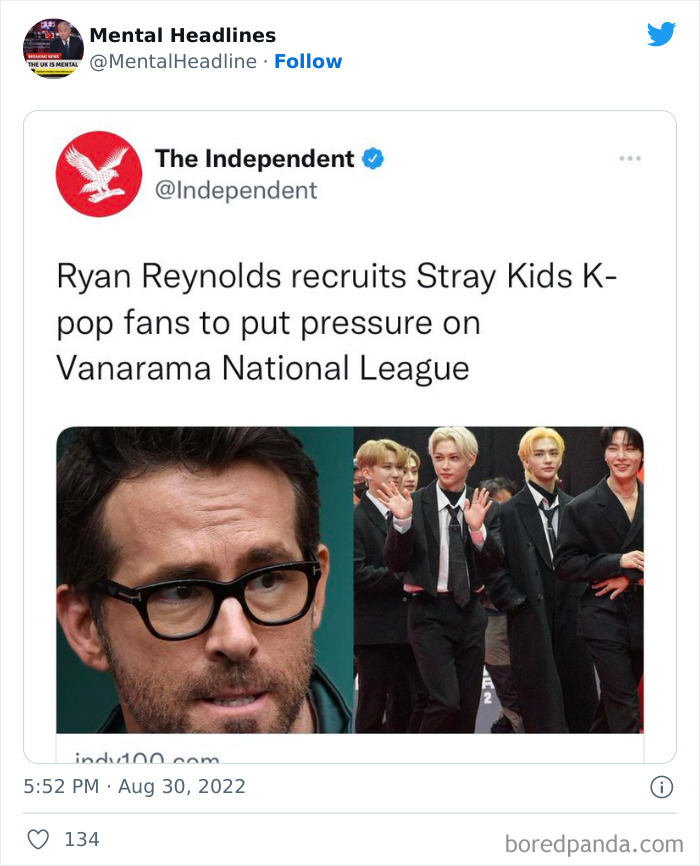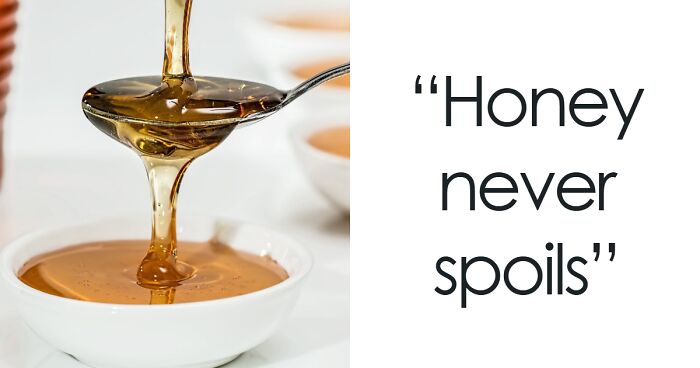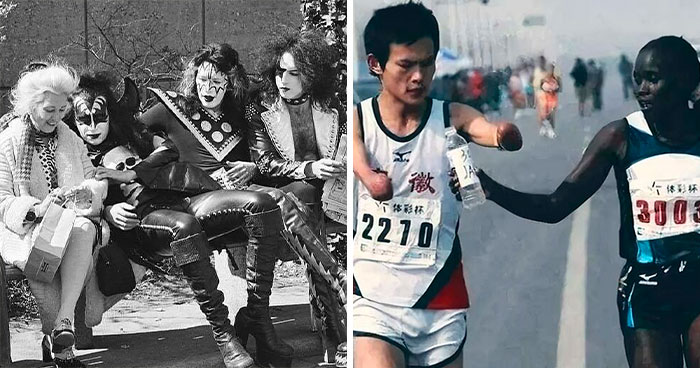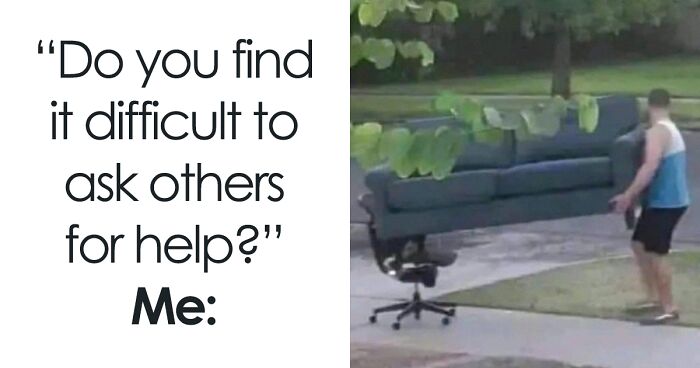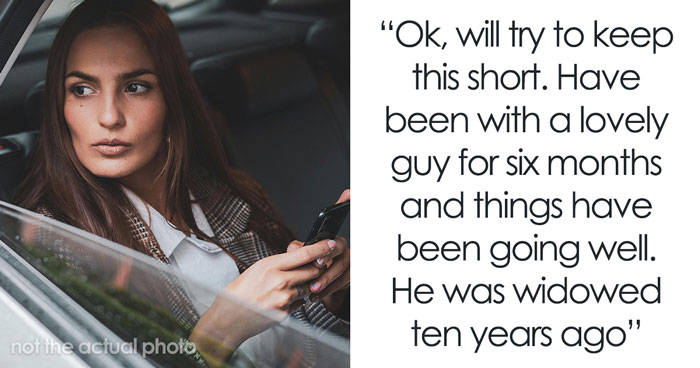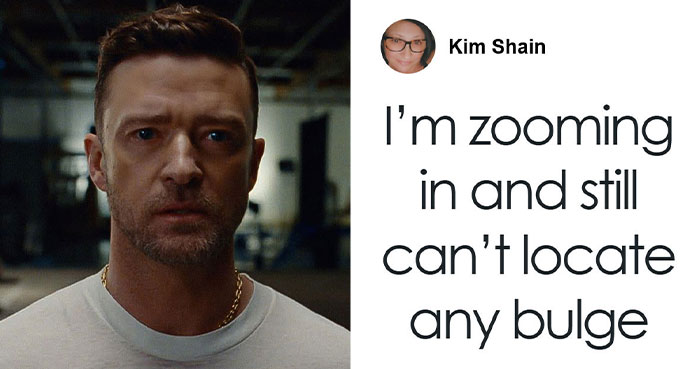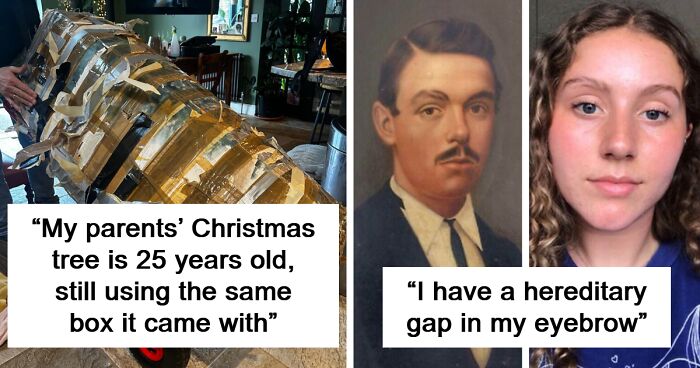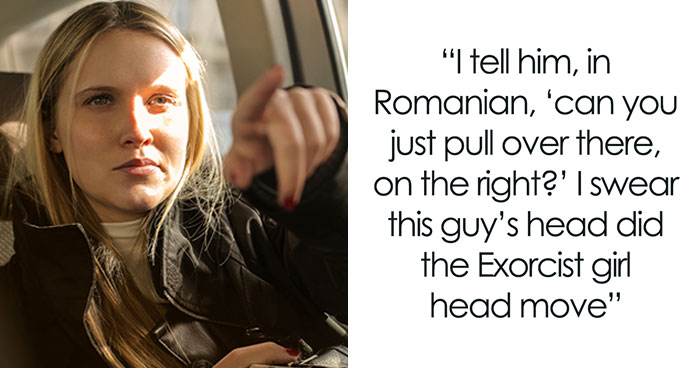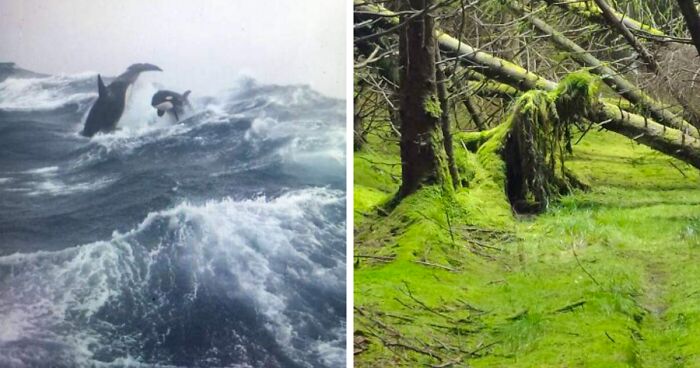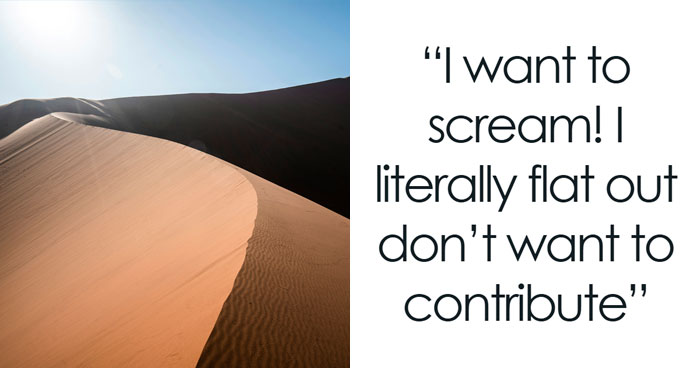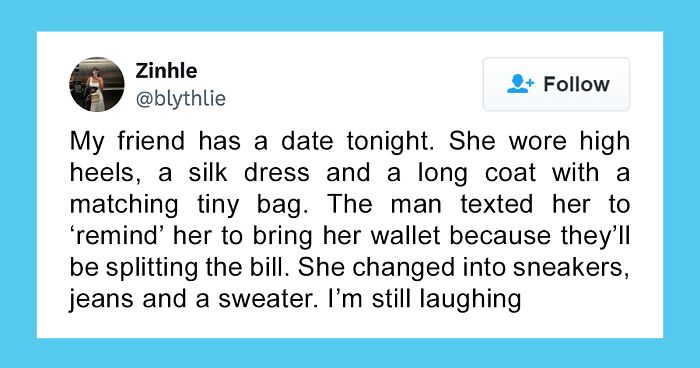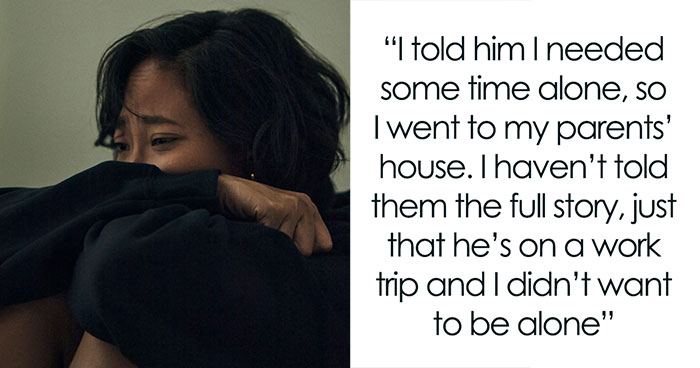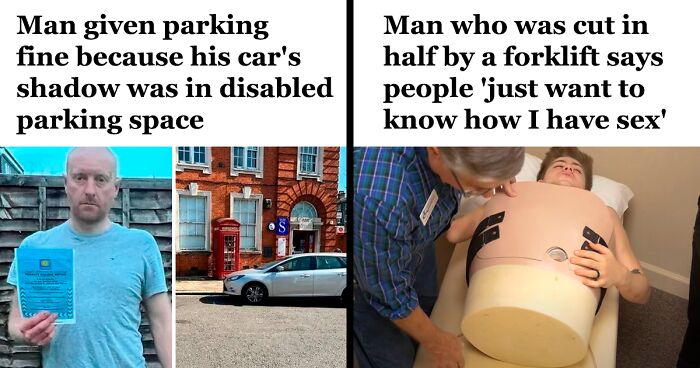
This Twitter Page Collects 50 Of The Funniest News Headlines Ever Spotted Online (New Posts)
We say this advisedly: news headlines are a whole other world. Being defined by attention-grabbing pith and clever use of puns, sensational tabloids prove time and again that the news is anything but boring. Love or hate the yellow press, but wordsmiths know that scandal sells, so they conjure up outlandish headlines to help us keep tabs on every hilariously bizarre thing happening on our planet.
Need convincing? Just take a look at the 'Mental Headlines' Twitter account. With nearly 119k followers, the social media project features some of the funniest, weirdest, and downright bizarre titles and news stories spotted online. Ever since its first post, this page proves that wild and ridiculous human antics will never go unnoticed.
From "Police Hunt For Man Who Chewed Bus Seat" to "Baby Made To Wait To Hours For Unicycling Doctor", we have wrapped up a collection of some of the best headlines from the account. So pull your seat closer and brew yourself a hot cup of coffee because we’re about to take a hilarious ride down to the land of absurdity. Be sure to upvote your favorite pics, and let us know what you think below in the comments!
Psst! For more headline madness, check out Part 1 of this feature right here.
More info: Twitter
This post may include affiliate links.
I need to know why places think it's a good idea pro ban shorts for guys,they'll find a loophole
The 'Mental Headlines' project is fairly new as it only started up in April 2021. It’s safe to assume that most Twitter users follow the page just for fun, but accounts like this are a great way to show how many weird events are happening in the world. A brief scroll through this list may be all it takes to convince you that reality is truly stranger than fiction. Even when we live in a digital age where few things can genuinely surprise us, people (and animals!) still manage to exceed our expectations.
News stories ranging from charming to downright bizarre inevitably lead to funny headlines that are gaining popularity online every day. One reason behind this is that the accessibility of the internet has become a powerful dissemination tool. Amusing news items from far-away places are much more available now, providing entertainment to millions of readers every day.
To gain more insight into our fascination with weird news, we reached out to Dr. Vincent Campbell, Deputy Head of the School of Media, Communication and Sociology at the University of Leicester. According to him, tabloid-style translates very well into the digital world. "The pithy, clipped tabloid use of language suits the rapid clickbait culture of online and social media. Whether that's ultimately a good thing in terms of the quality of news overall is a matter of substantial debate, of course," Dr. Campbell told Bored Panda.
The associate professor pointed out that tabloids and clickbait use similar approaches to attract audiences. "The ease of superficial engagement — the seconds looking at something then clicking to the next thing is a key factor."
A duck walks into a bar and asks: "Got any Bread?" Barman says: "No." Duck says: "Got any bread?" Barman says: "No." Duck says: "Got any bread?" Barman says: "No, we have no bread." Duck says: "Got any bread?" Barman says: "No, we haven't got any f*****g bread." Duck says: "Got any bread?" Barman says: "No, are you deaf?! We haven't got any f*****g bread, ask me again and I'll nail your f*****g beak to the bar you irritating bastard of a bird!" Duck says: "Got any nails?" Barman says: "No" Duck says: "Got any bread?
Another thing that changed with the rise of social media is that the readers became fully integrated into the process. "Now the audience does the work for you as a producer, through all the liking. upvoting and sharing. The relative costs of trying to find something that has a wide reach when compared to traditional media content, a Hollywood genre film, say, are also much lower," Dr. Campbell explained.
"Also, lots of scope for things that might have once been much more niche 'weird' areas of interest, trapped in specialist subscription magazines, say, to get out into the wider media environment/public consciousness and achieve far greater reach."
The catchy and odd nature of these stories sparks our curiosity and boosts our desire to consume them. The best headlines (and the most hilarious ones!) grab the reader’s attention and invite them to a noteworthy adventure. And it’s no secret that getting your headline clicked is hard work. To make an impression on the potential reader, it has to be sharp, accurate, rhythmic, and a perfect tease to the words that follow.
But since it’s often difficult to make day-to-day happenings sound intriguing, it’s much easier to come up with absurd headlines to intrigue the audiences. As Dr. Campbell said, everyday things are rarely news. "Thousands of uneventful plane journeys every day is not news, the occasional plane crash is always news. So, news is kind of predisposed to the unusual, unexpected — even in the routines of things like political news, the search is ever for the latest brewing scandal, or gaffe or what have you."
"Beyond that, given 'serious' news is so often focused on the bad things happening in the world, 'weird' news acts as a kind coping mechanism or pressure valve, offering moments of levity and humor to counterbalance the bad stuff," he added. "Even when stuff is obviously nonsense, it serves in a kind of boundary space between fact and fiction — just as things like the Weekly World News used to do, online media does that now."
With the right mix of panache and simplicity, it’s entertaining to devour stories that bend the limits of imagination. But they also prove that most things can be considered newsworthy these days. The problem is that with such heaps of stories that grace our feeds every day, we have to ensure we take no information for granted as truth.
According to Dr. Campbell, anything can be news — it's all about context. "Like the recent front page headline in the Metro about Boris Johnson that read 'PM Turns Up for Meeting', as this was quite unusual for Johnson to actually be seen to do his job."
"Headlines are more about attracting the reader, so there's arguably more leeway than in actual reporting, but there can be lines over outright falsehoods, in terms of acceptability if not lines that news media outlets, even mainstream ones, never cross," the associate professor said. People need to become informed and savvy consumers of media and always question the stories they come across.
https://rifnote.com/2021/07/11/london-borough-apologises-for-having-actor-in-bare-bottomed-monkey-costume-with-mock-genitalia-encourage-kids-to-read-more-books/ Although this still leaves many questions unanswered...
Unfortunately, many readers forget to do their due diligence before sharing stories on social media. Researchers at Columbia University and the French National Institute published an independent study where they found that 59% of all links shared on social networks have never actually been clicked on — users retweeted the news without bothering to read it.
"People are more willing to share an article than read it," study co-author Arnaud Legout said. "This is typical of modern information consumption. People form an opinion based on a summary, or summary of summaries, without making the effort to go deeper."
That's got to be an interesting conversation. "Sorry, you're really cute, but my synaesthesia makes your name smell like p**s."
This is why Dr. Campbell stressed that "always read the article — don't go just on the headline" is crucial to follow. "It's important to be a reflective consumer of claimed factual content — don't assume that if it aligns with things you already think it's necessarily definitely the truth, and always try to use a range of sources of news to check before sharing anything with others."
I think it's because the headline and picture make no sense. So breathe easy; you're not dumb.
Load More Replies...Yeah. Ok… Now try telling the head editor that you weren’t stoned at the time…
That is Pyramid Lake in northern Nevada, land of the Paiute Trube and that is the story told by their people that used to happen before the arrival of the white people.
Guessing the twitter user(s) for Mental Headlines is British and reports on what they see
Load More Replies...They actually put babies on beaches for the high tides to carry disfigured and disabled children out to sea.
"I don't really share some of the more catastrophizing views of online news, that fakery is endemic and undermining democracy, etc. because, to an extent, news accuracy has always been a problem, weird beliefs pervade human history, and audiences interact with content in more complex ways than is often claimed."
"It's still the case that overall people now have many more competing and varied potential sources of information than they did decades ago when people read one newspaper, watched one television news broadcast, and maybe listened to one radio station. It's in our hands as audiences to take advantage of that potential to be reflective and critical consumers of news," Dr. Campbell concluded.
"I was diagnosed with MS and I just thought, I need to get healthier and feel better." - she visited a hypnotist and now it's a variety of foods.
If this was true he could almost fill 9 big hot air balloons. There are 157.788 million seconds in a year. Multiply that by 5 is 788.94 million seconds. Let's say that an average fart is 1 second and the average fart is 0.065 liters. 788.94 million farts for 0.065 liters is 51 281 100 liters. A big hot air balloon contains about 5663369 liters. That is just over 9 large hot air balloons. (9.0548 5sf)
My favourite headline was in The Sun, reporting on a football match between the Scottish teams Celtic and Inverness Caledonian Thistle FC. Celtic were expected to win but Inverness (shortened to Cally Thistle) managed to beat them. The headline was: "Super Cally Go Ballistic, Celtic Are Atrocious" P. S. Just think of Mary Poppins if you don't get the joke...
When I was in England, I loved to read the paper. There were a few that had these "zingers" in them. I love "play on words". There were tons of political puns but not knowing the system and how it work, I was sometimes lost. I did have a friend that spent the time explaining, but we met up at a pub, so after drinking a few pints, nothing made any sense.
So many weird Brit items here -- I don't know which one to choose! (They ARE a strange bunch at times -- but always interesting.)
My favourite headline was in The Sun, reporting on a football match between the Scottish teams Celtic and Inverness Caledonian Thistle FC. Celtic were expected to win but Inverness (shortened to Cally Thistle) managed to beat them. The headline was: "Super Cally Go Ballistic, Celtic Are Atrocious" P. S. Just think of Mary Poppins if you don't get the joke...
When I was in England, I loved to read the paper. There were a few that had these "zingers" in them. I love "play on words". There were tons of political puns but not knowing the system and how it work, I was sometimes lost. I did have a friend that spent the time explaining, but we met up at a pub, so after drinking a few pints, nothing made any sense.
So many weird Brit items here -- I don't know which one to choose! (They ARE a strange bunch at times -- but always interesting.)

 Dark Mode
Dark Mode 

 No fees, cancel anytime
No fees, cancel anytime 




